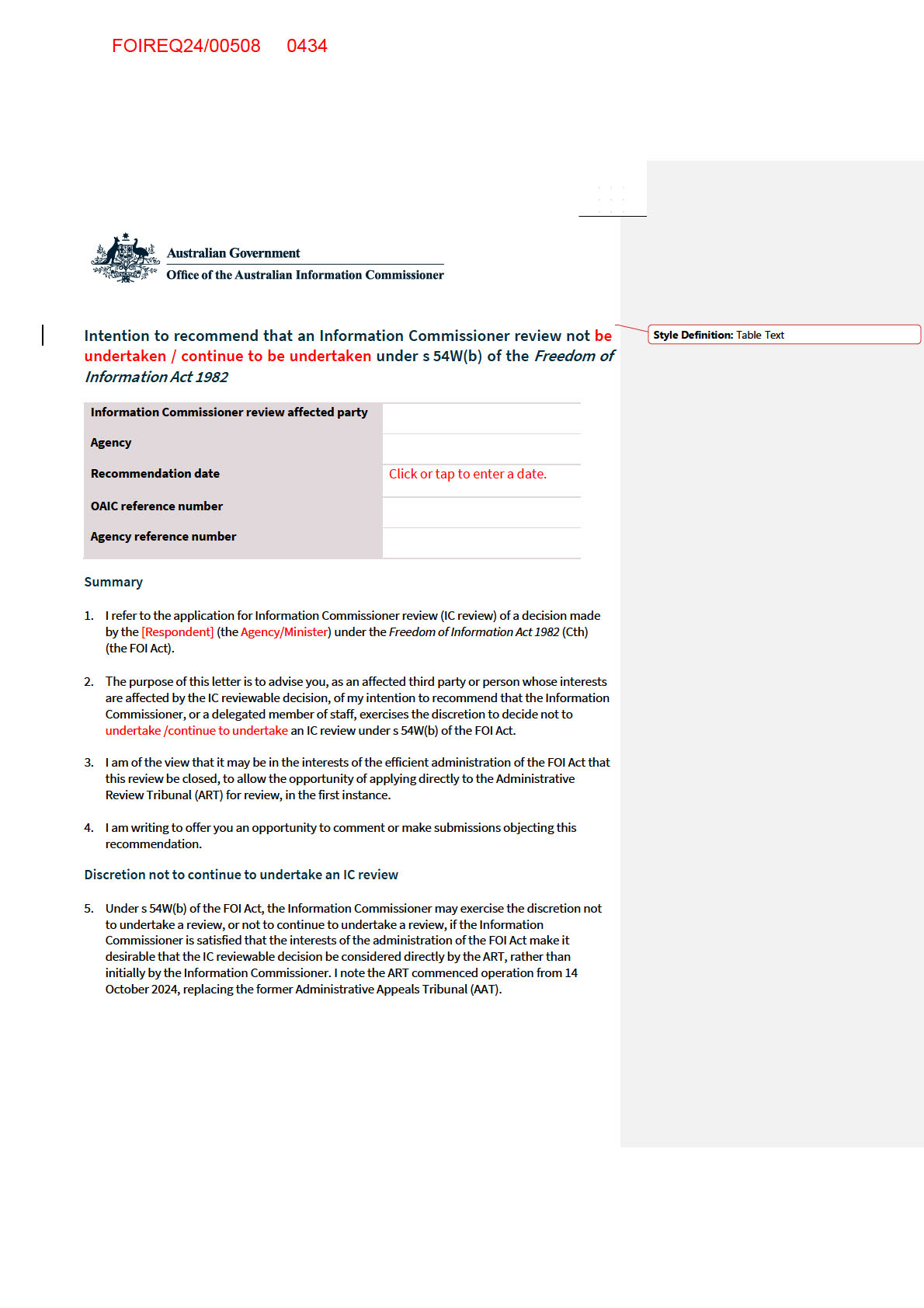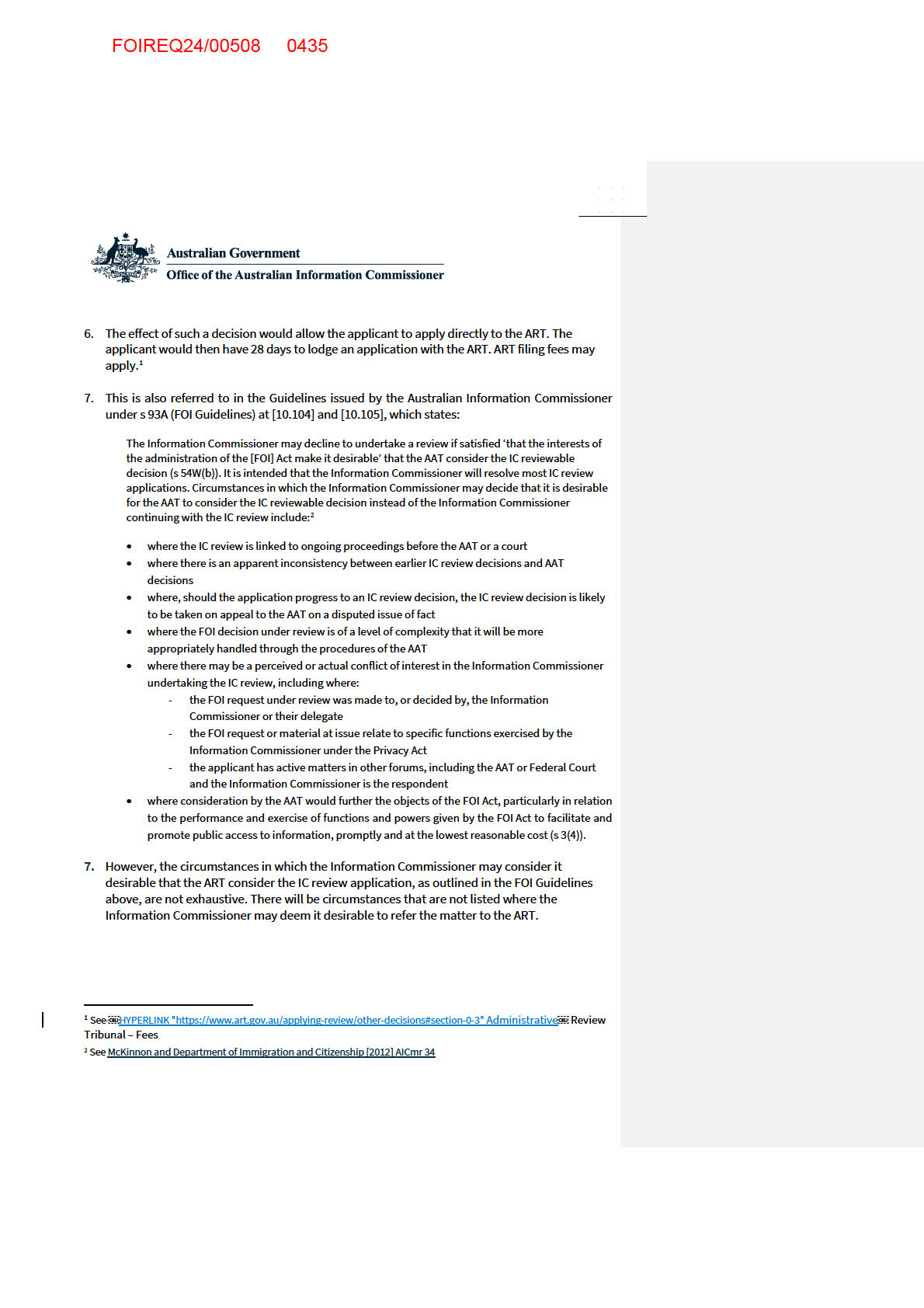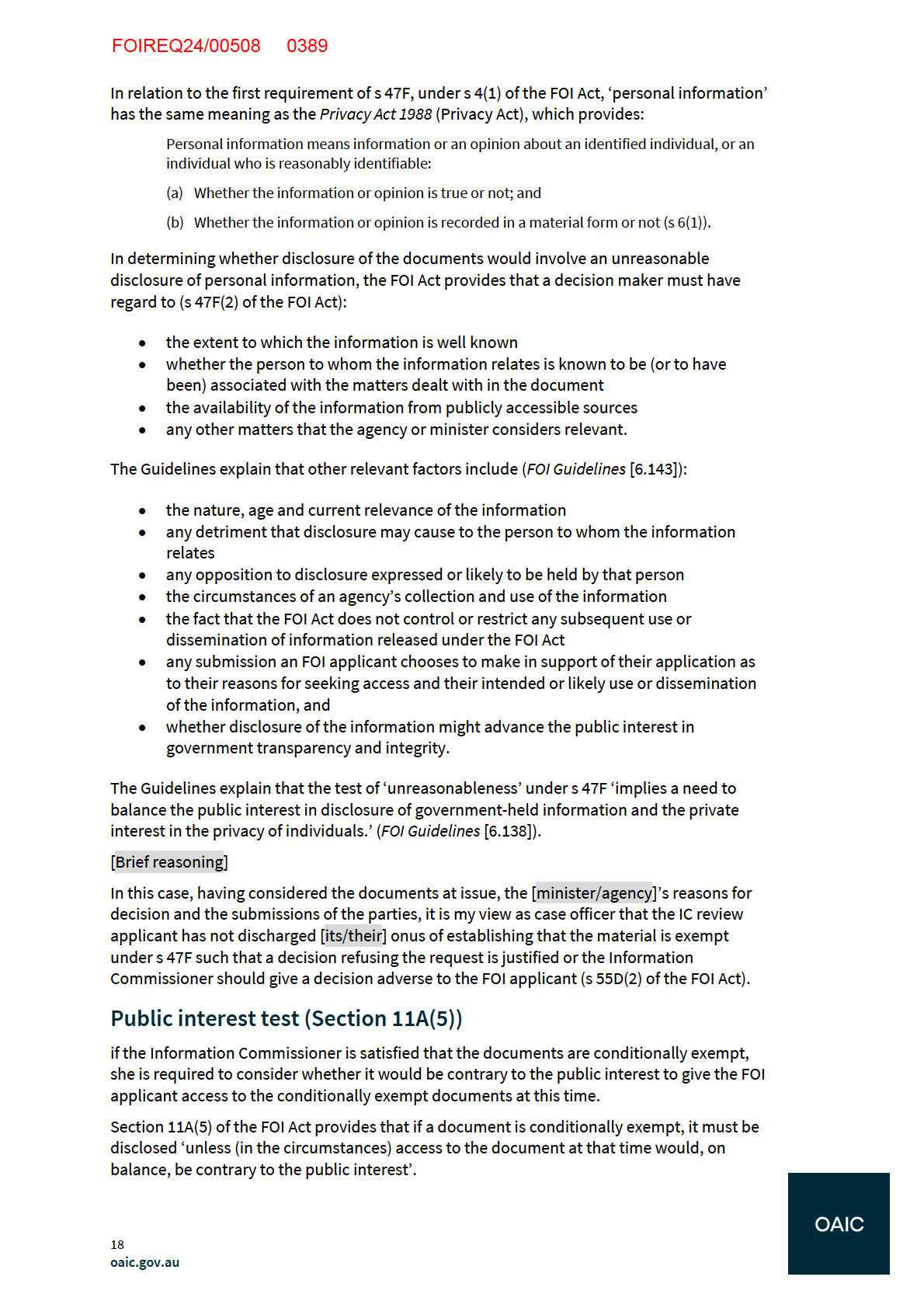
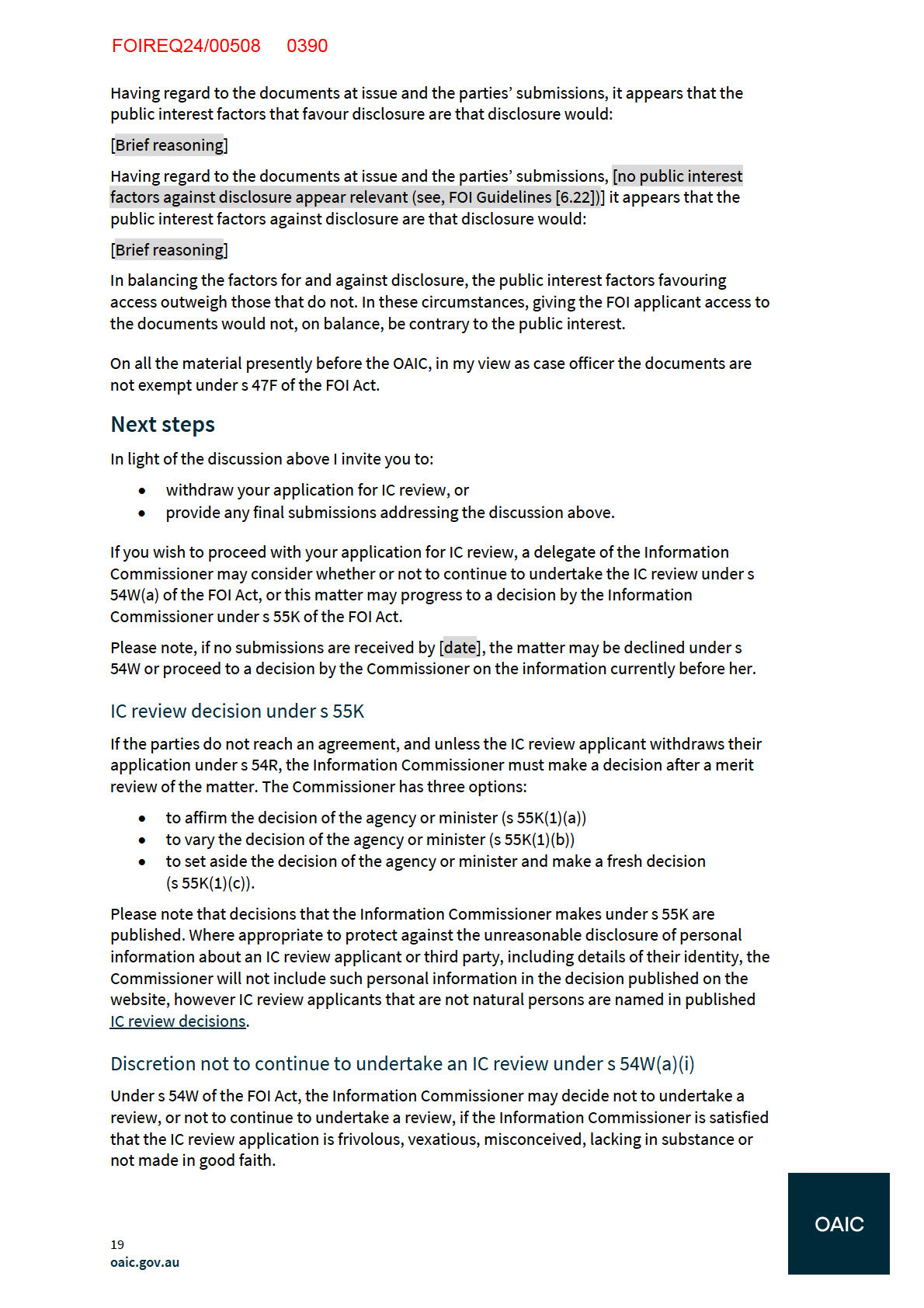
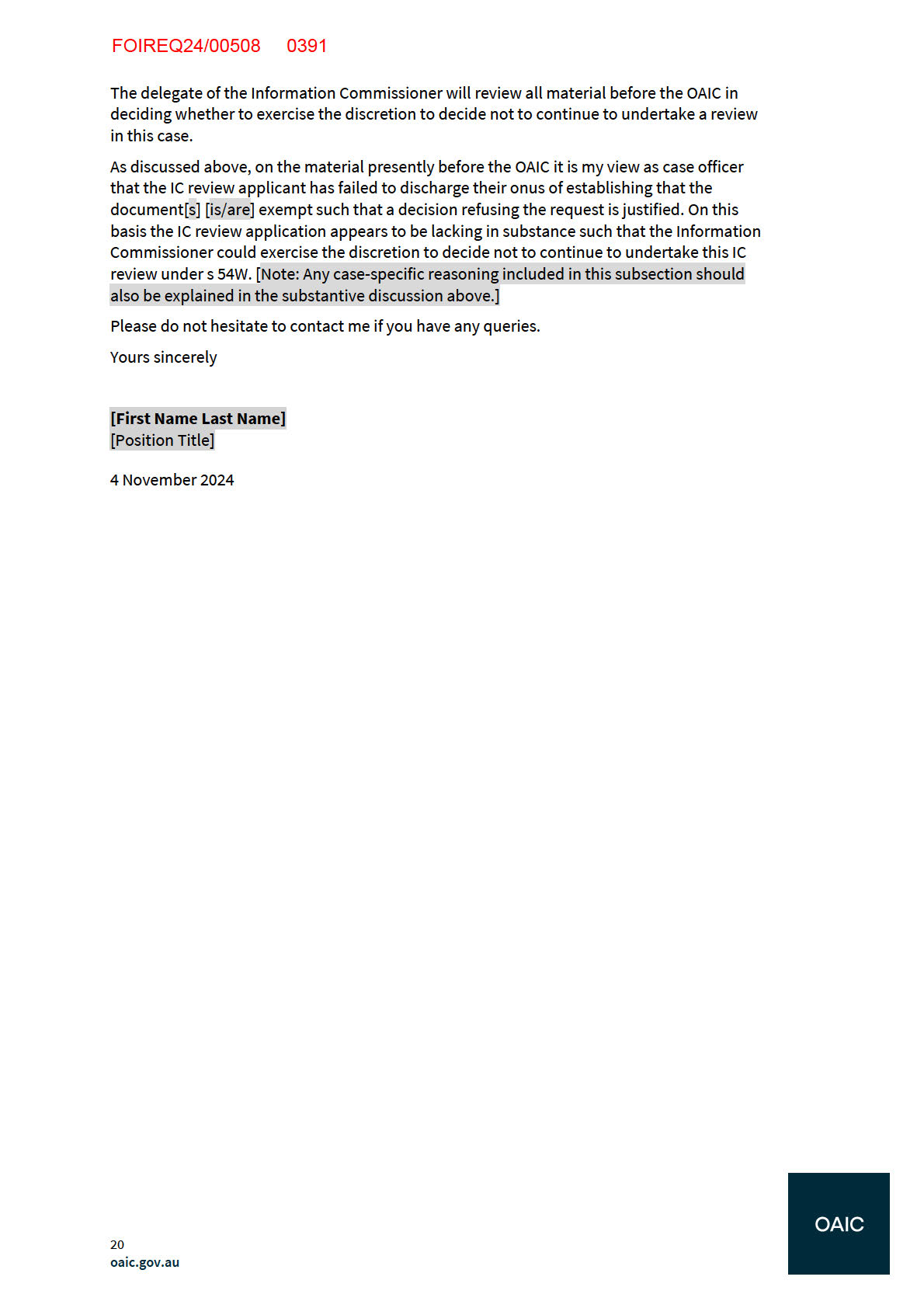
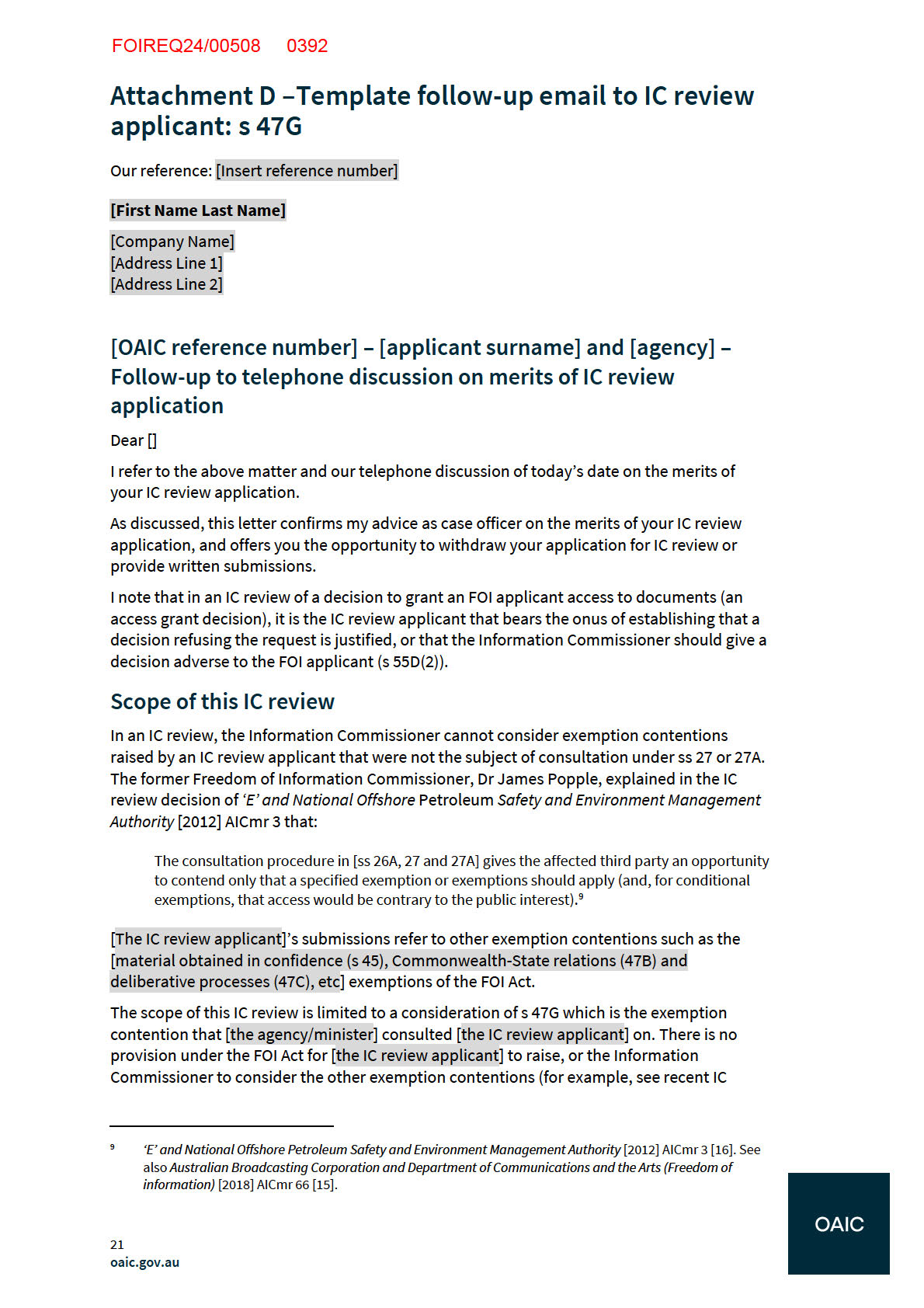
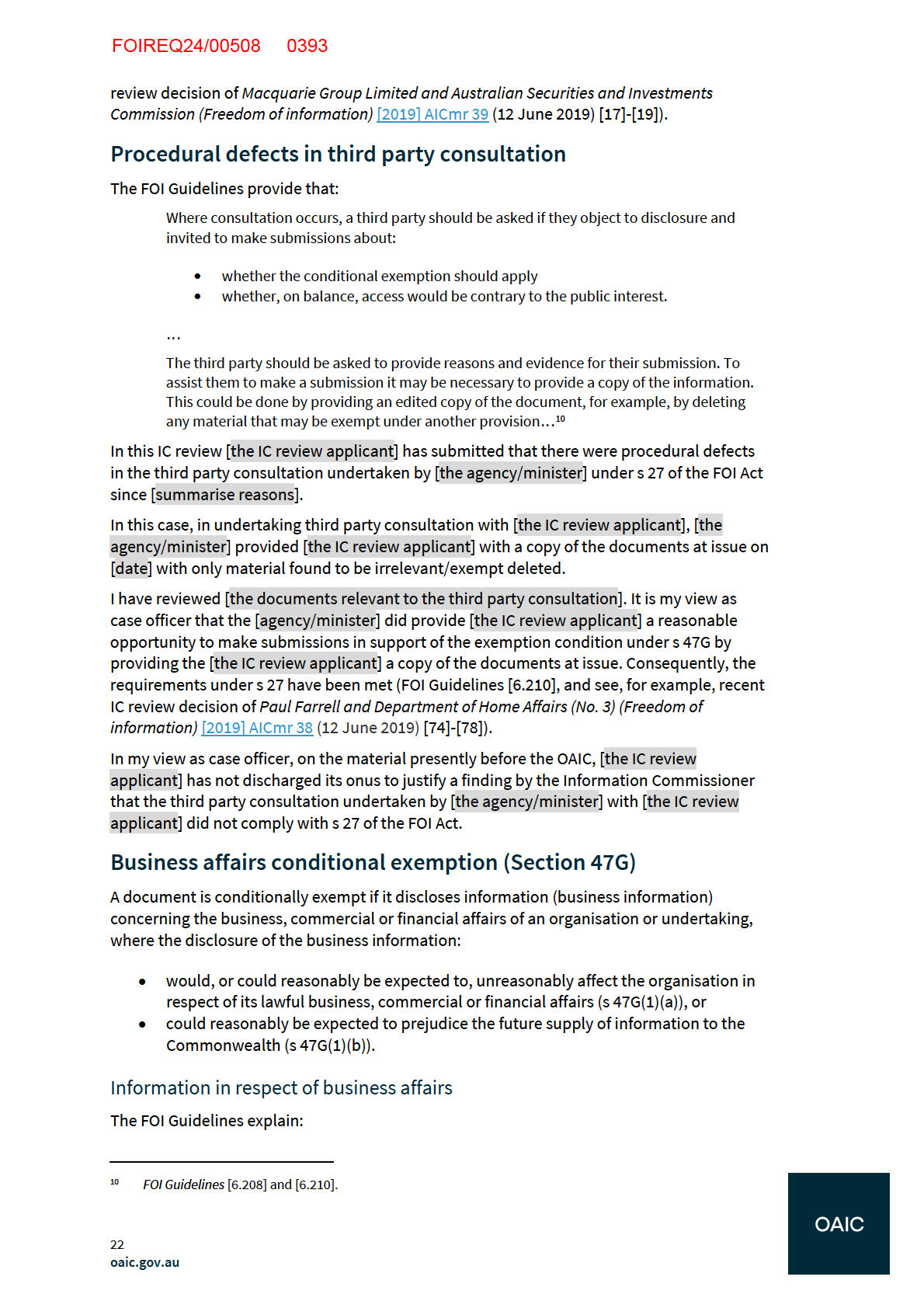
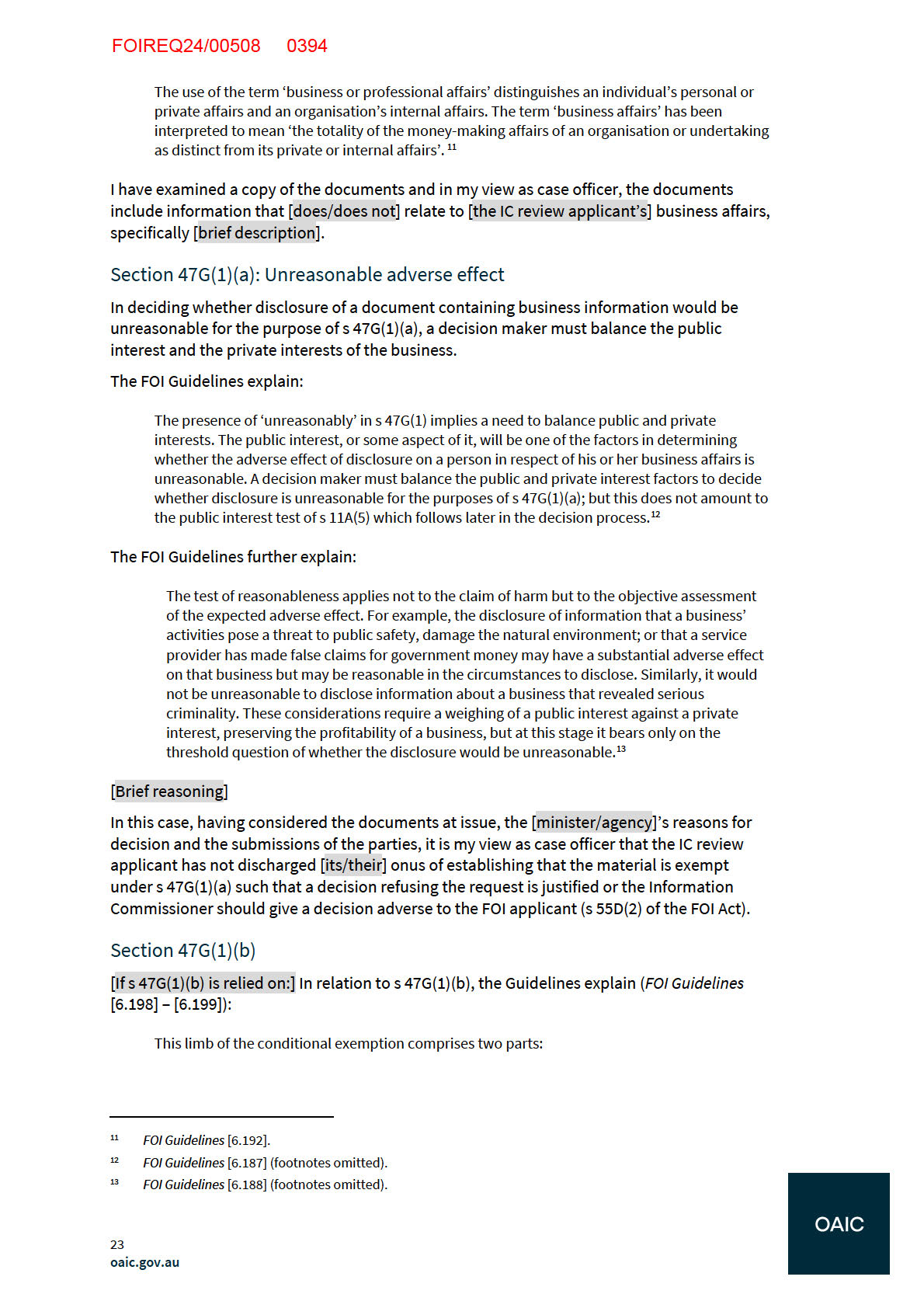
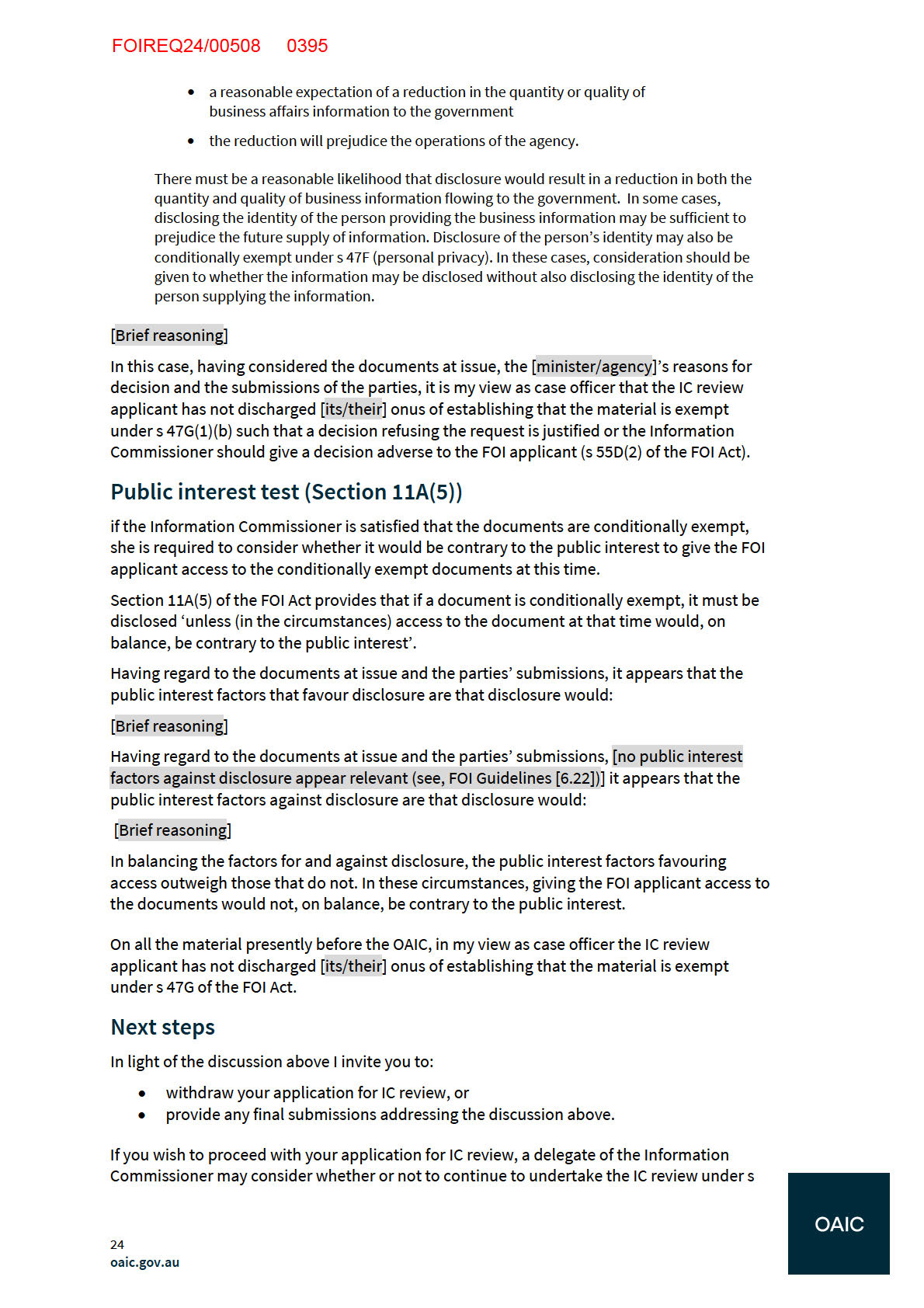
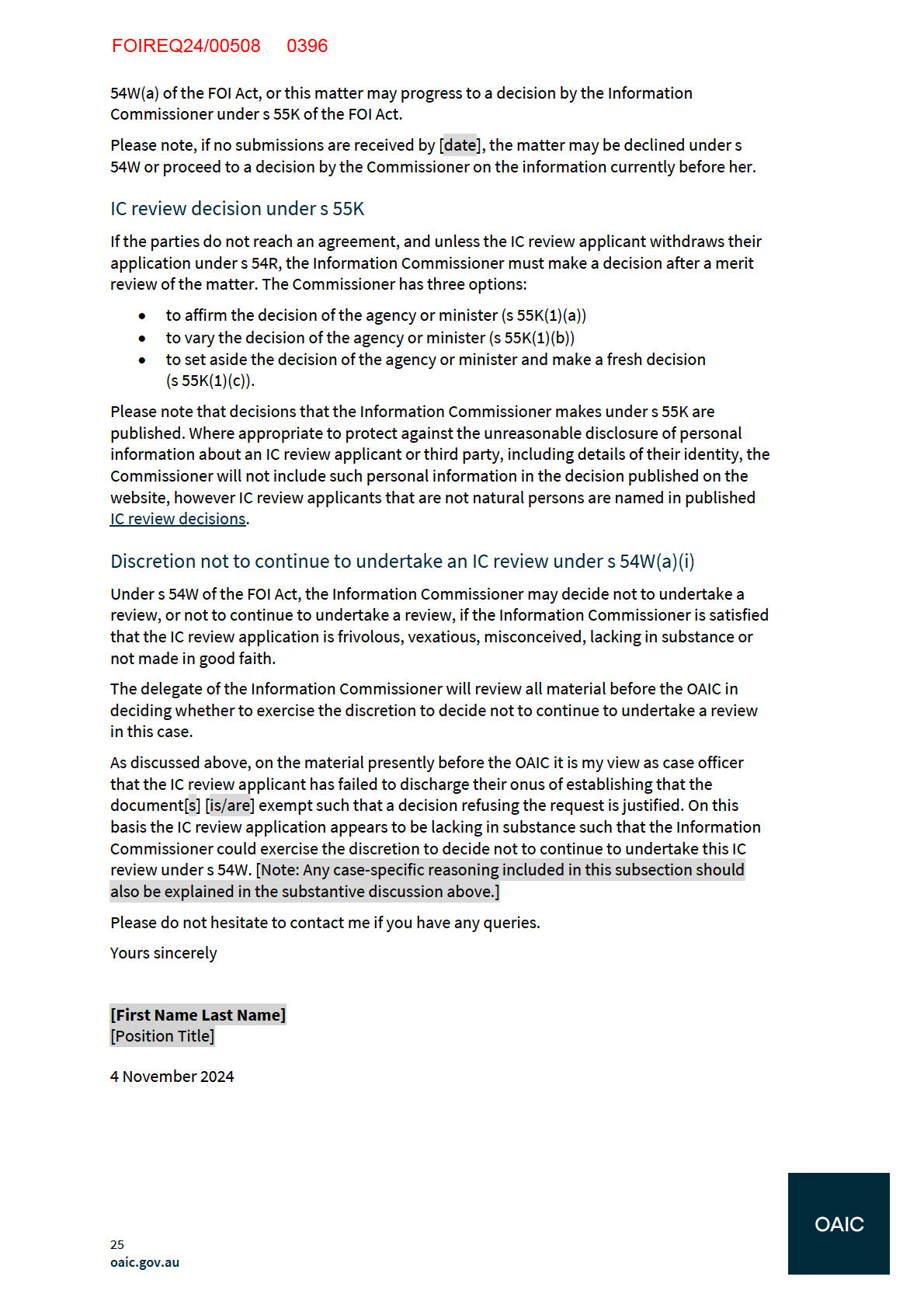
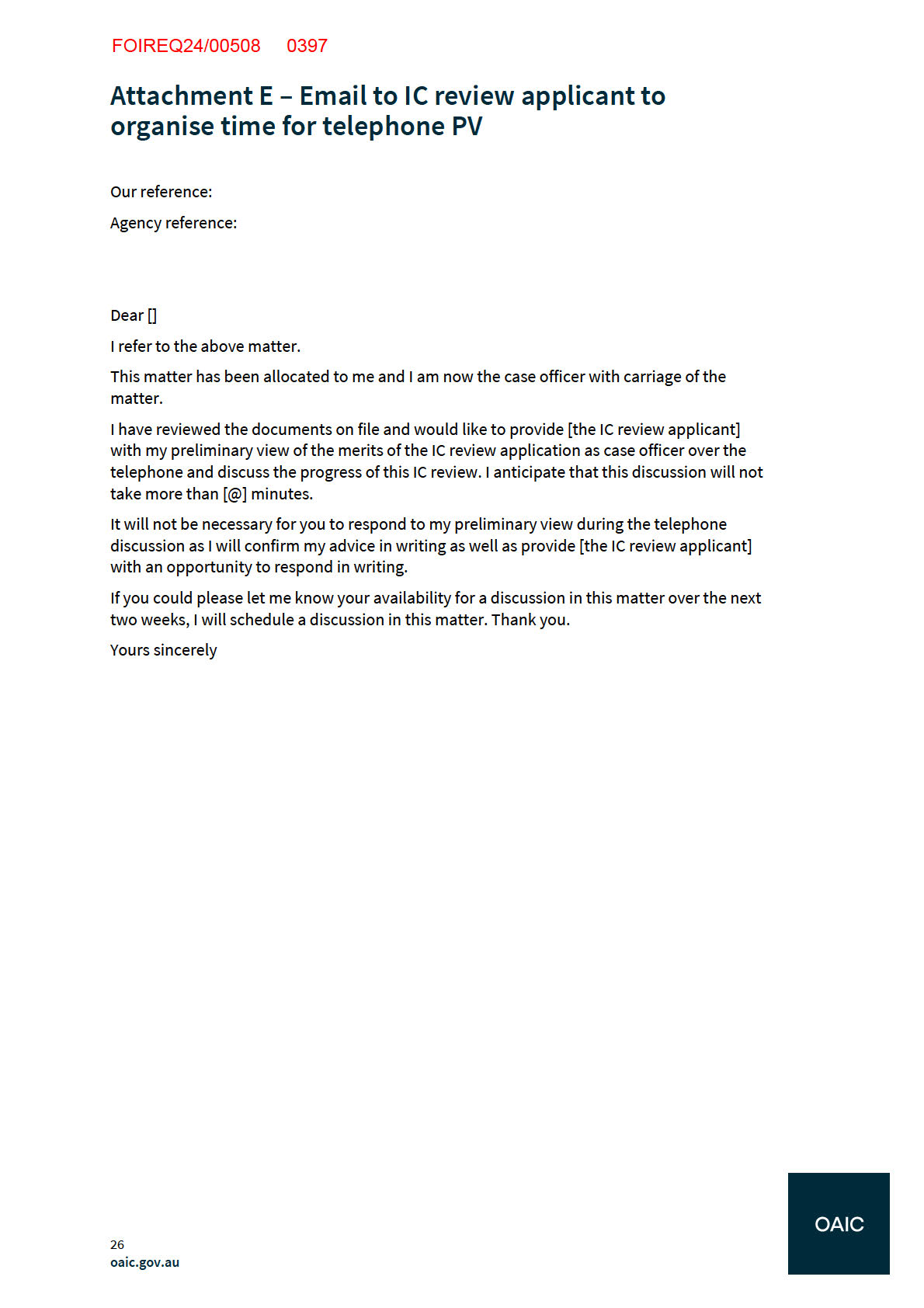
FOIREQ24/00508 0398
Agreement as to terms of decision on IC review
under s 55F of the Freedom of Information Act 1982
Between:
and:
This agreement as to the terms of a decision on IC review [reference] is between the parties to the
review, [applicant name] (the applicant)
and the [respondent name] (the respondent). The decision
under review is the [respondent]’s decision of [date], in which the [respondent] made a decision to
refuse access to documents under s 24 of the
Freedom of Information Act 1982 (the FOI Act) on the
basis that a practical refusal reason under s 24AA exists in relation to the applicant’s request.
The parties agree that:
1. The scope of the applicant’s request under the FOI Act of[date] is varied [or confirmed] as
follows:
[insert revised scope]
2. The agreed scope would not involve a substantial or unreasonable diversion of the
[respondent]’s resources.
3. The [respondent] will process the request in accordance with the processing period in
section 15 of the FOI Act. The period will commence when the parties are notified by the
Office of the Australian Information Commissioner of the implementation of this agreement
under section 55F(2) of the FOI Act.
4. The IC review application is finalised.
…………………………………………….
…………………………………………….
[applicant name]
[respondent name]
@ 2024
@ 2024
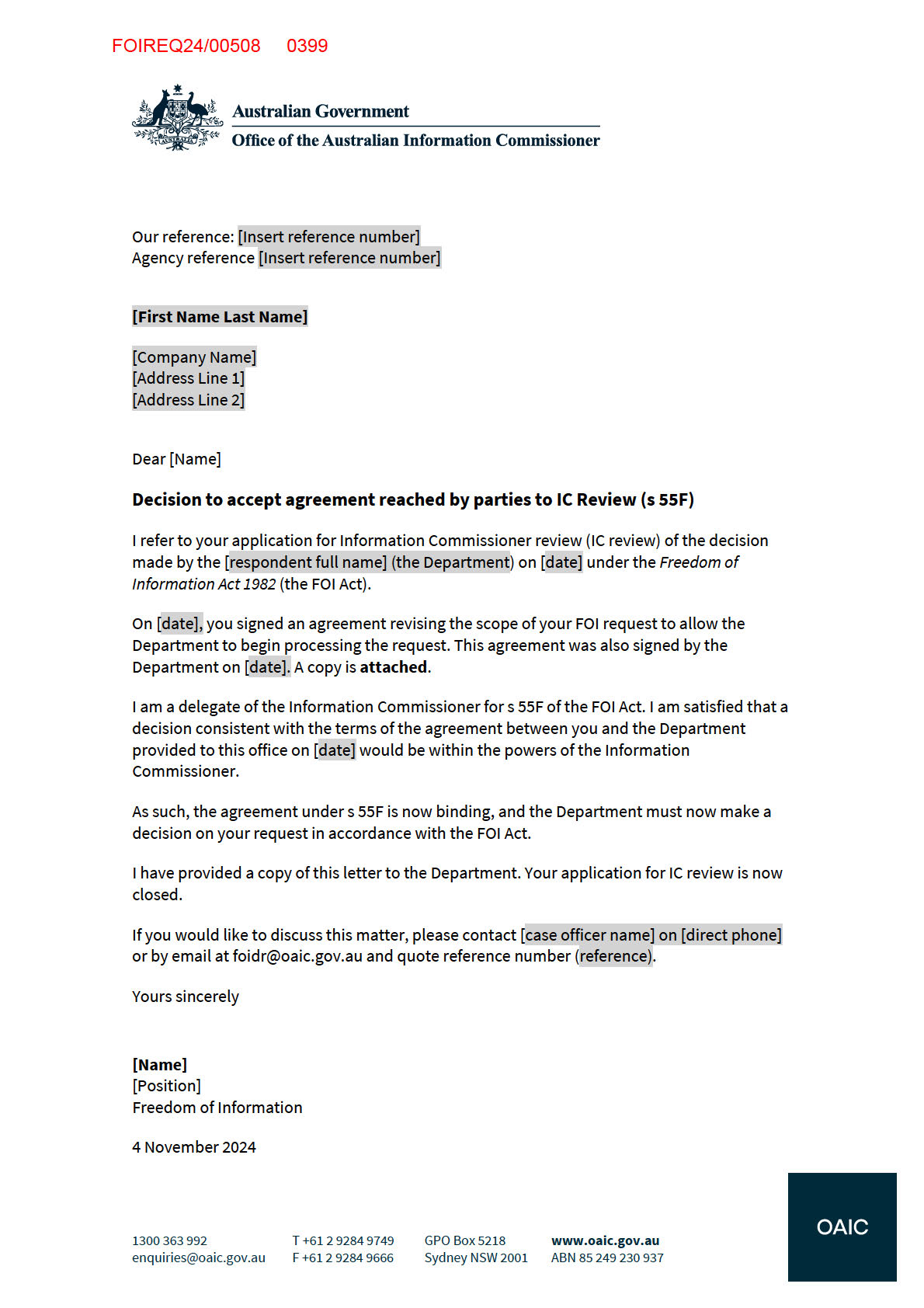
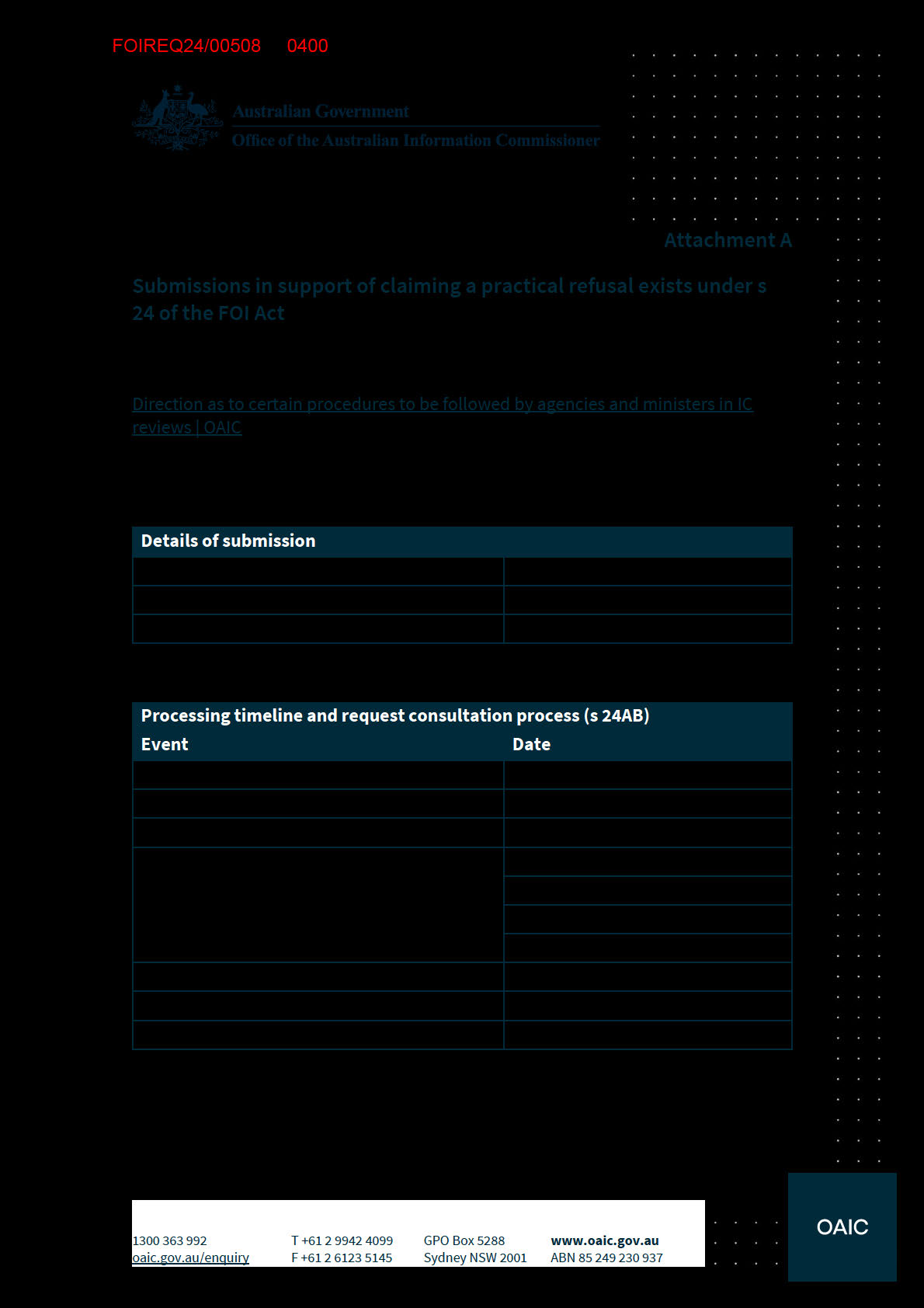
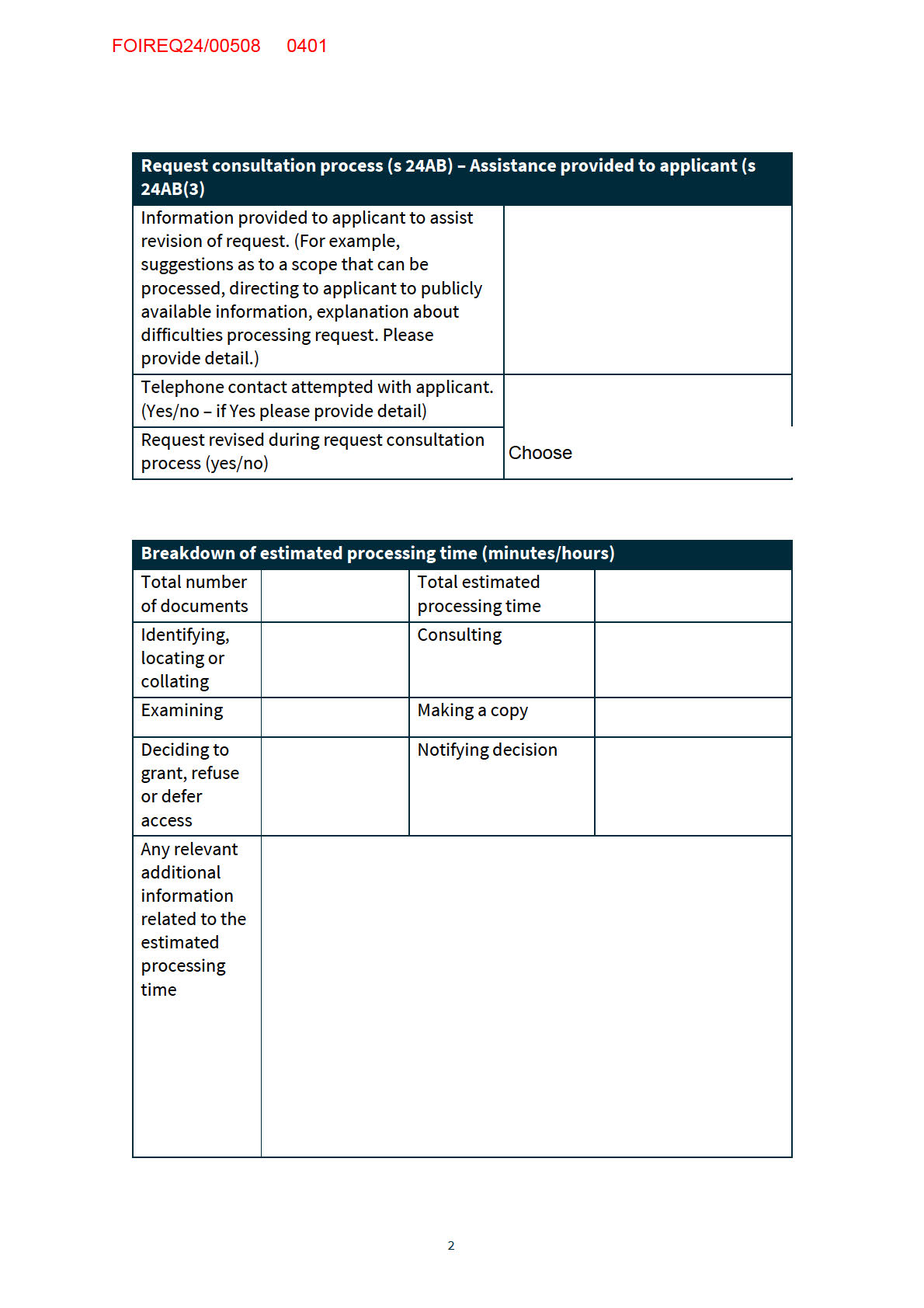
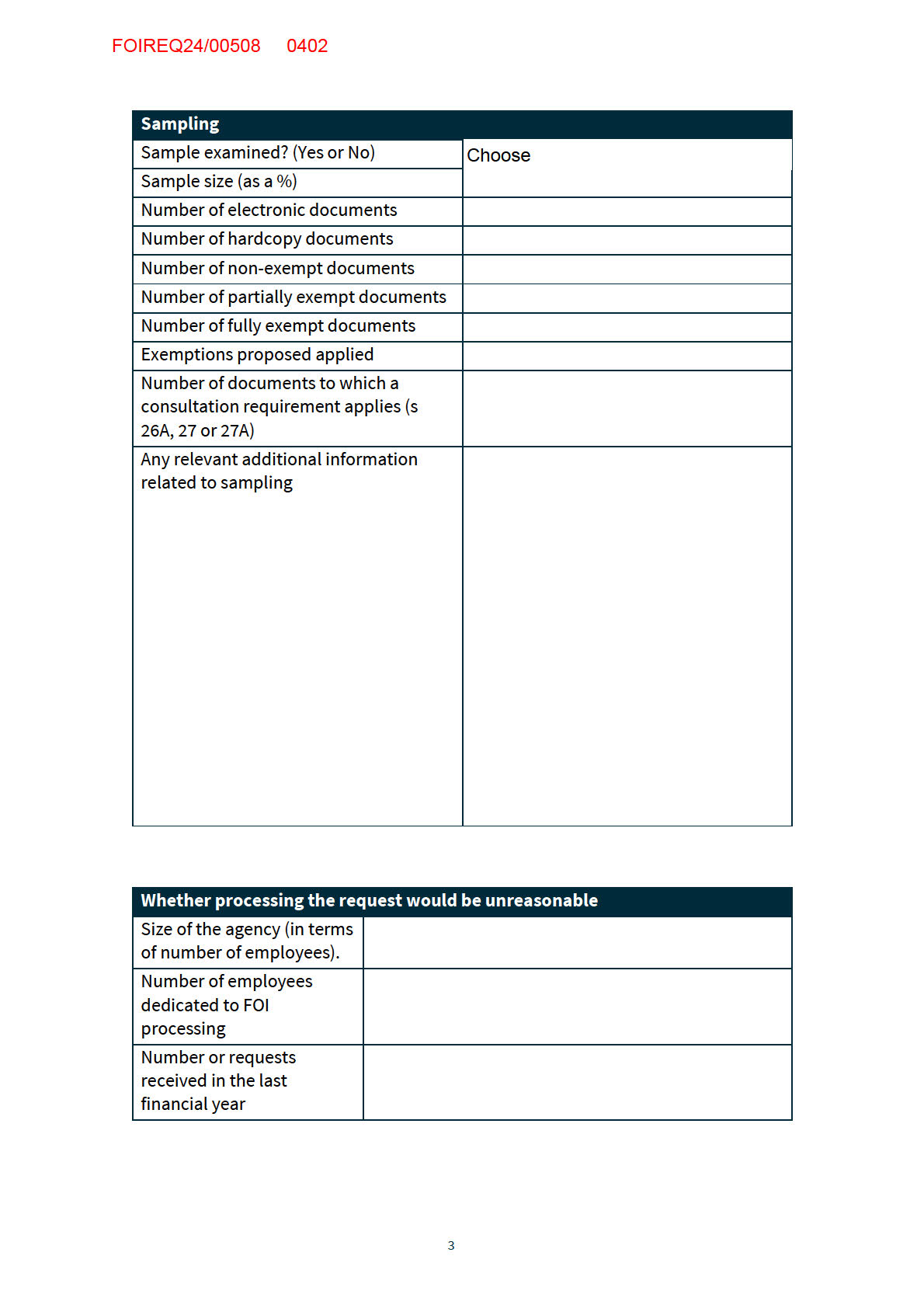
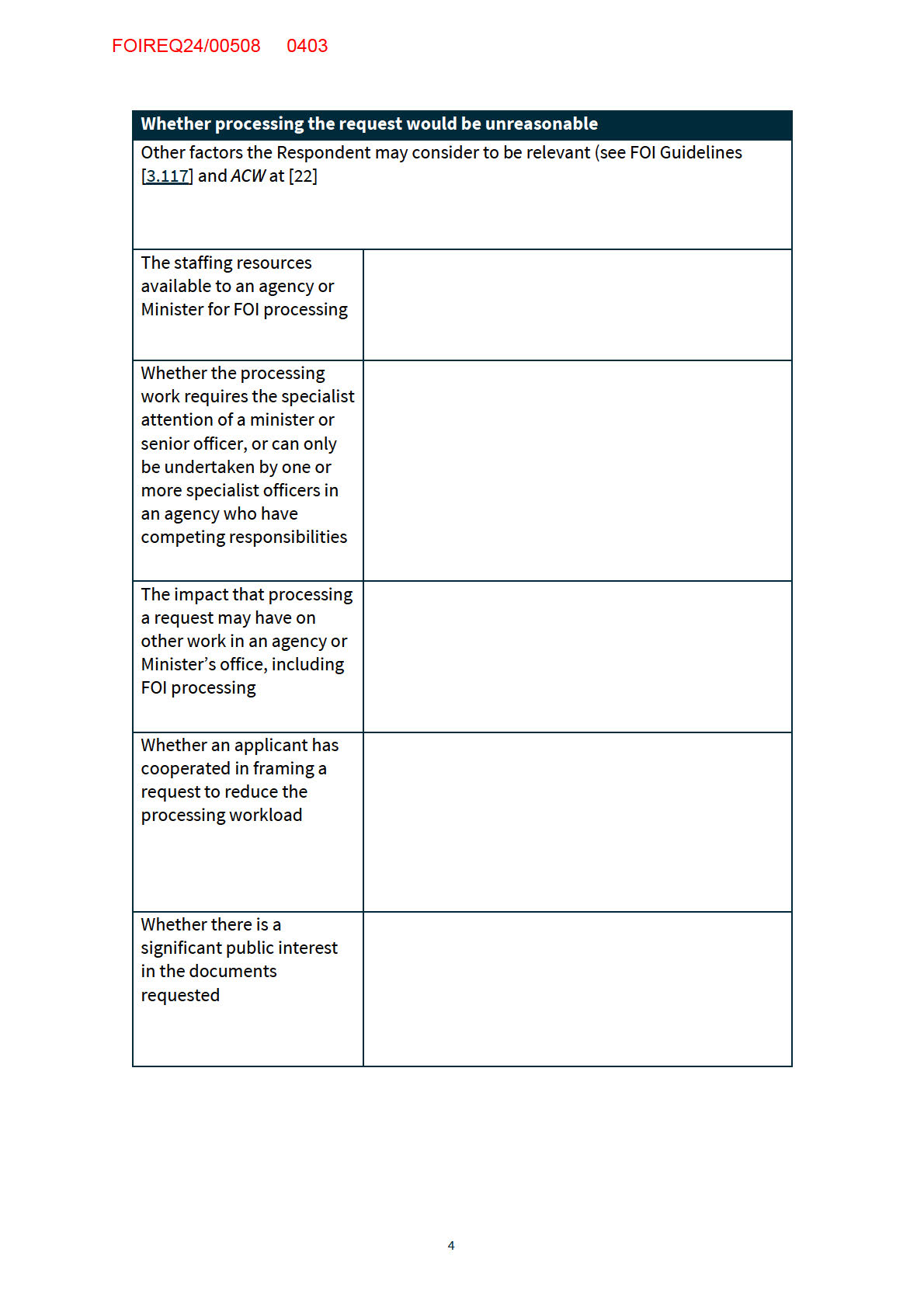
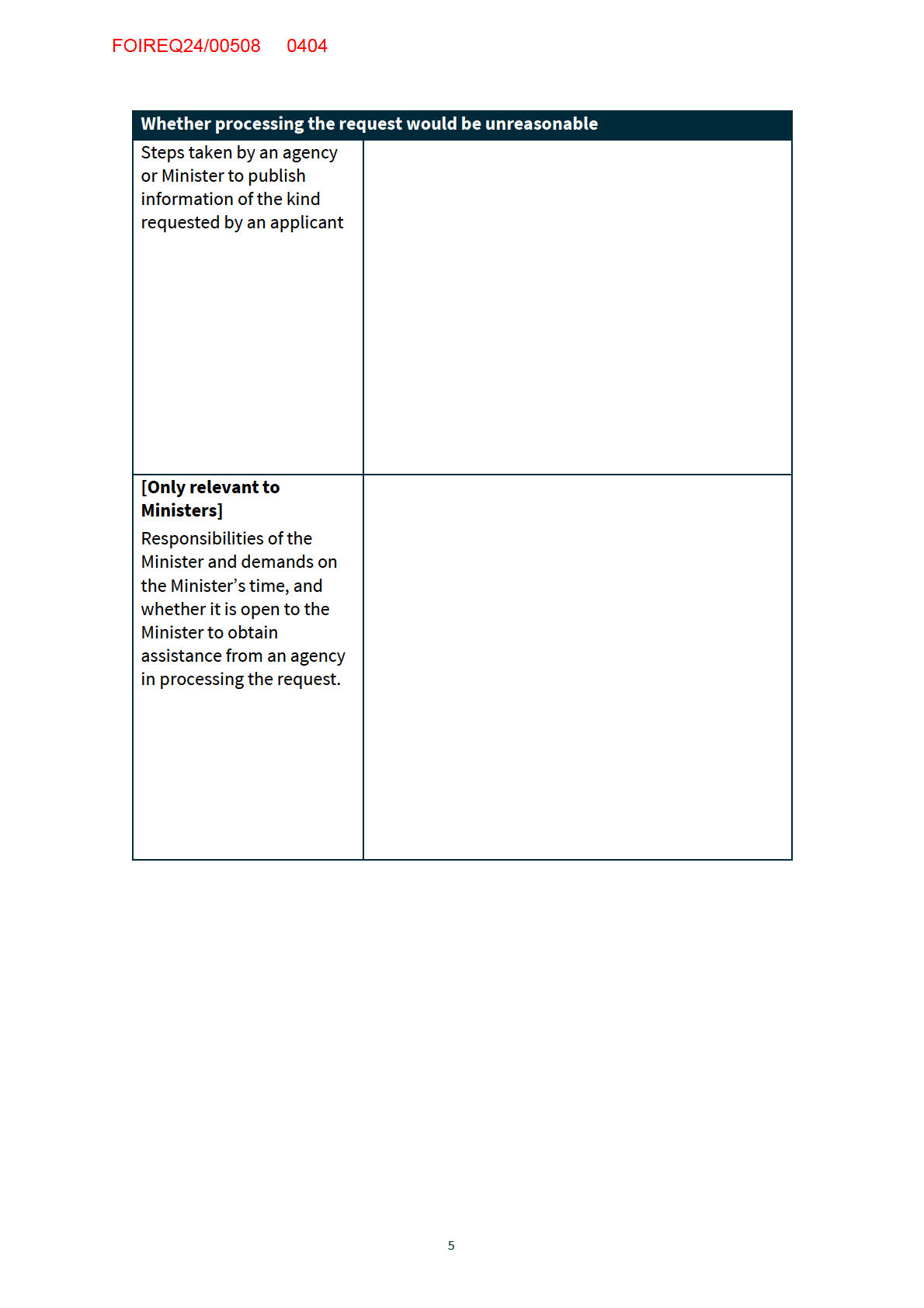
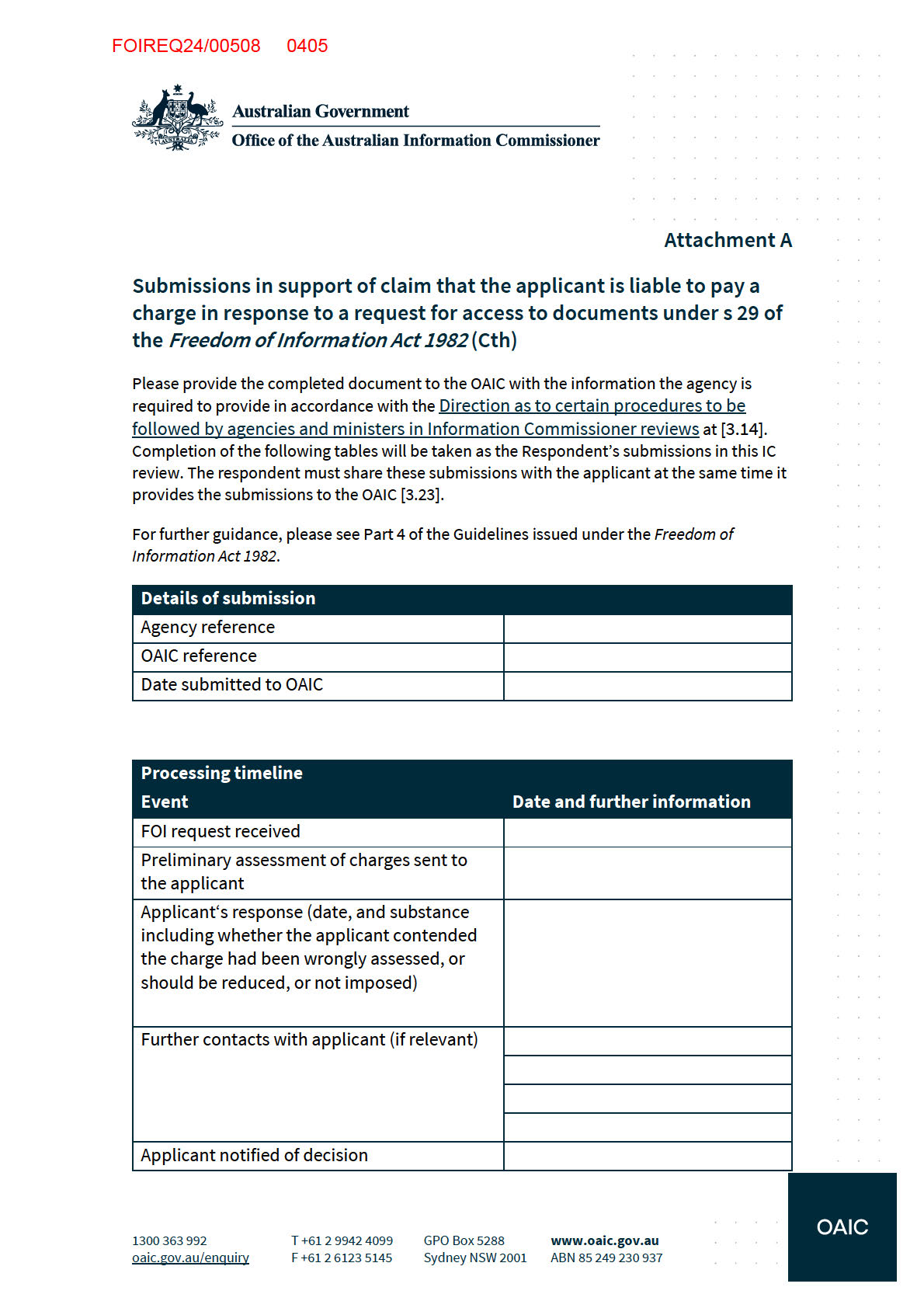
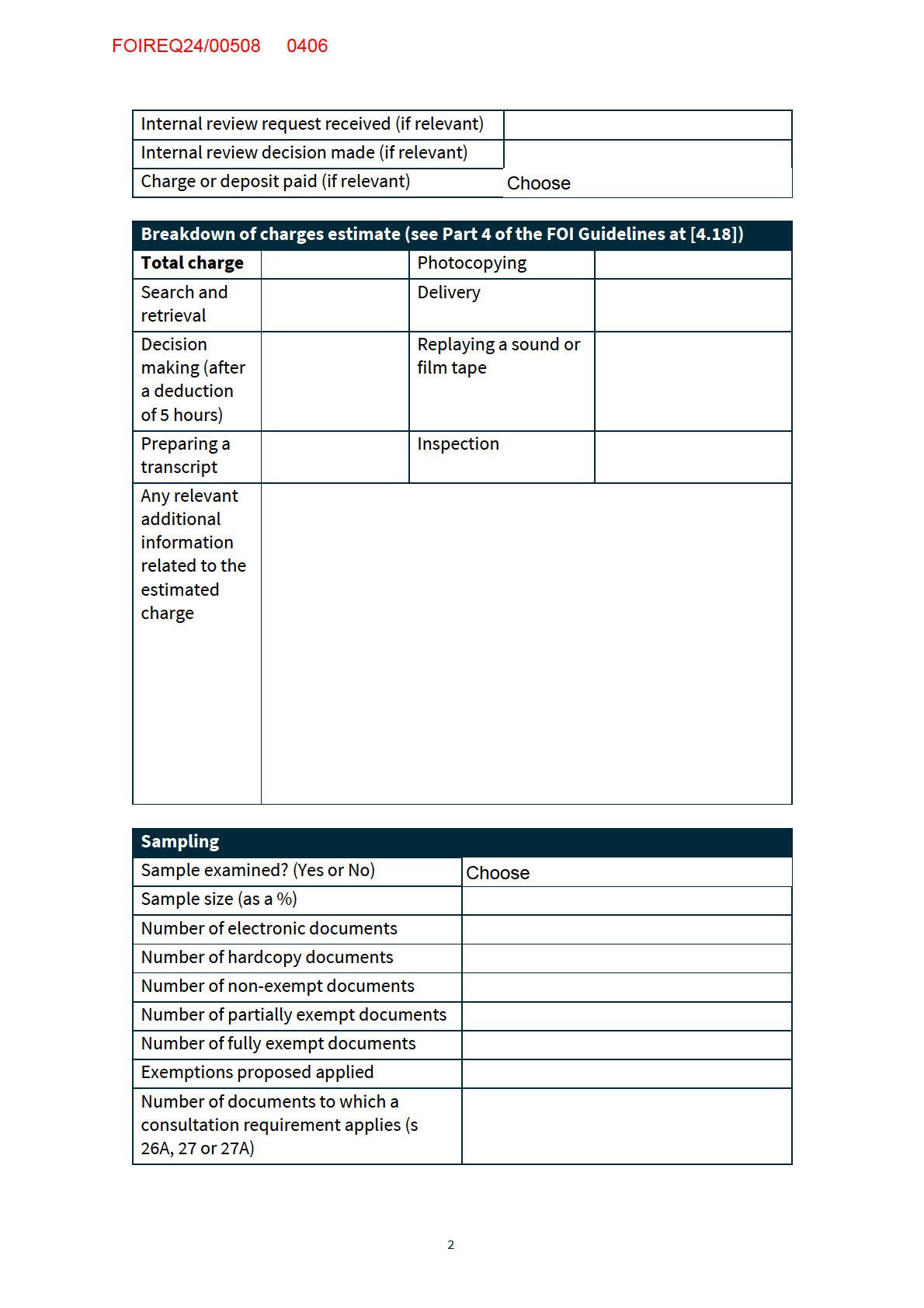
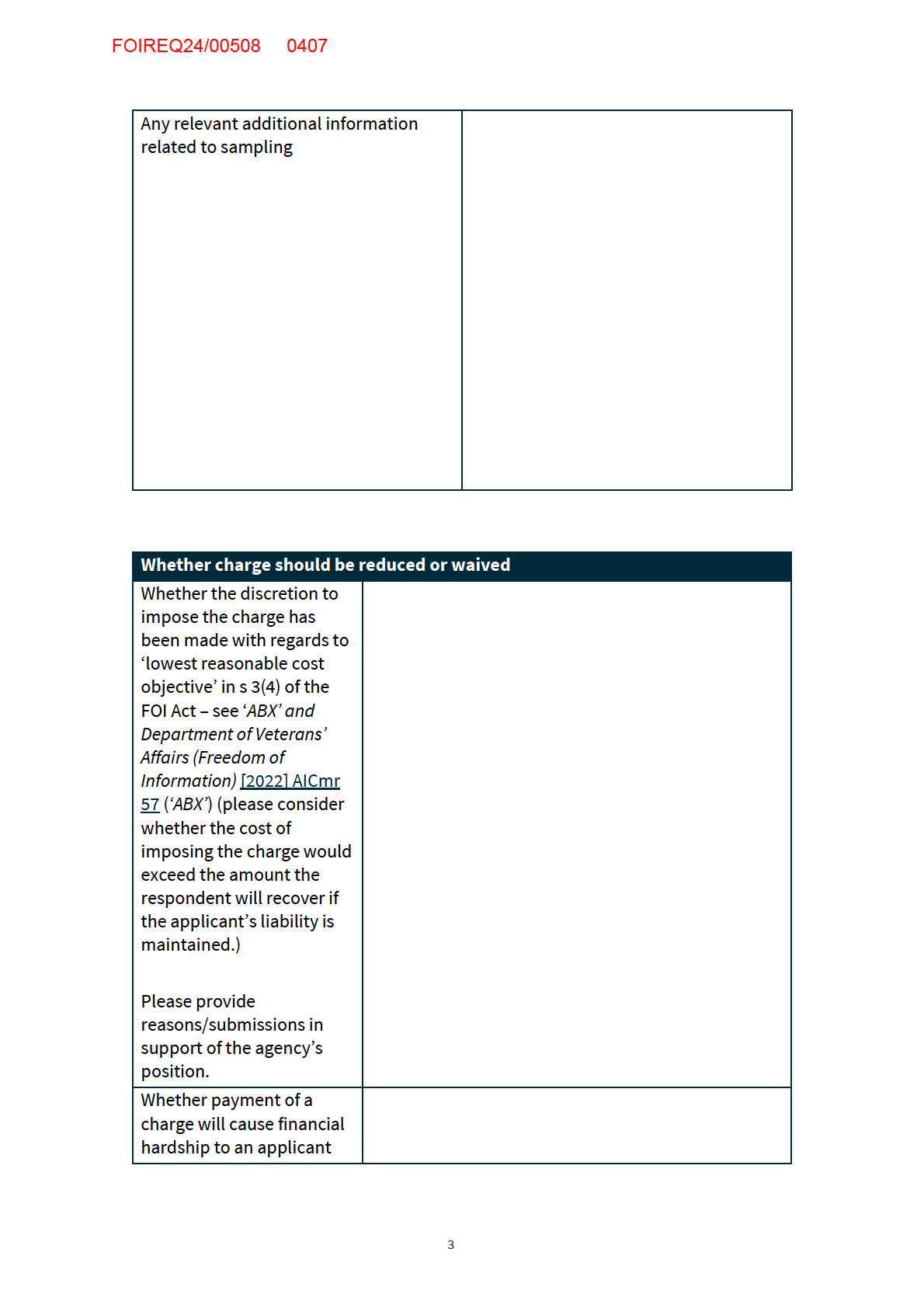

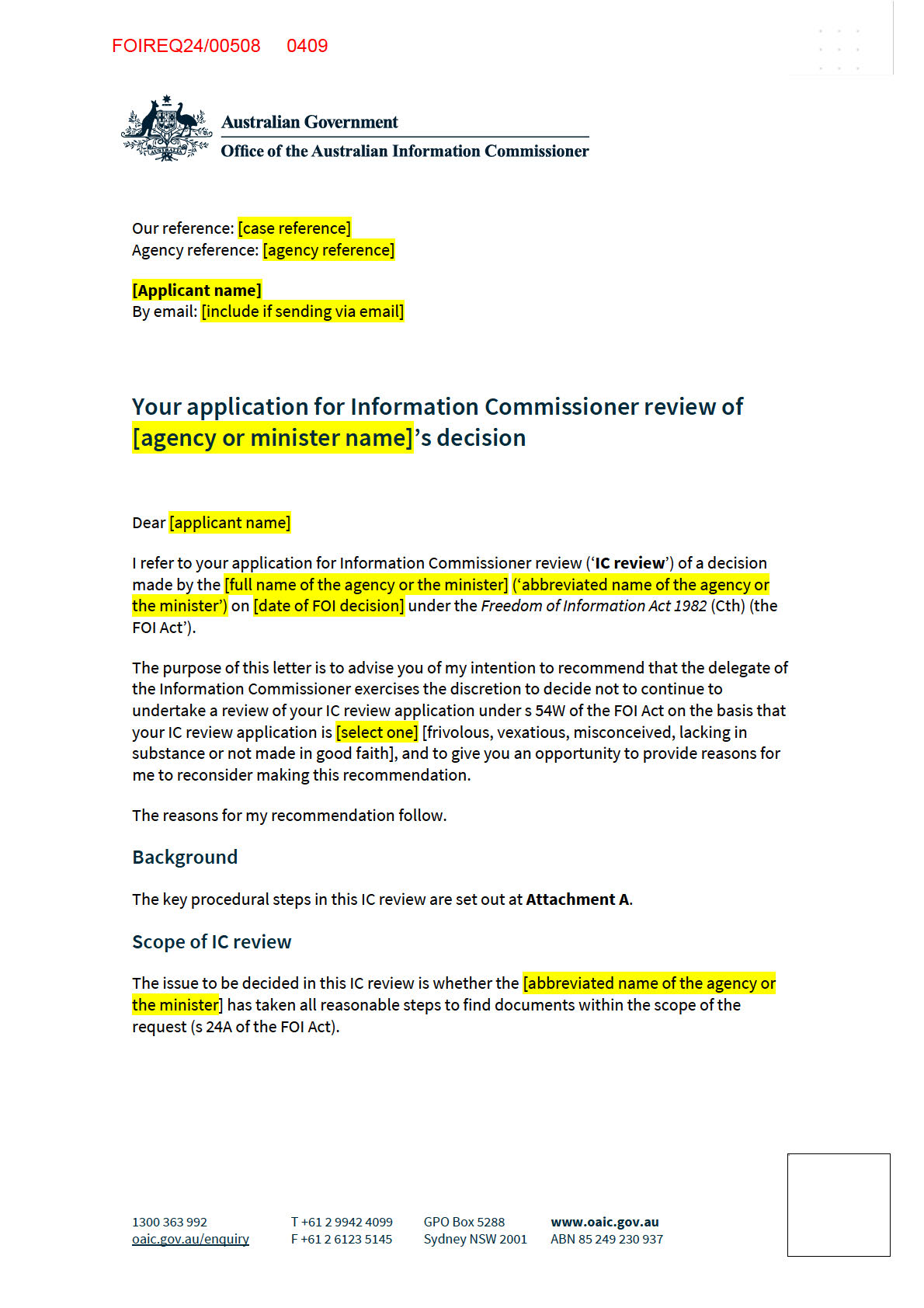
FOIREQ24/00508 0410
In forming my view as review officer, I have had regard to the following:
i. the (abbreviated name of the agency or the minister)’s and reasons for decision
of [date of original decision to FOI request]
ii. [if relevant] the (abbreviated name of the agency or the minister)’s internal
review decision and reasons for decision of [date]
iii. [if relevant] the (abbreviated name of the agency or the minister)’s revised
decision and reasons for decision of [date]
iv. evidence of searches undertaken by the [name of agency or minister]
v. the FOI Act, in particular s 24A
vi. the Guidelines issued by the Australian Information Commissioner under s 93A
of the FOI Act to which agencies must have regard in performing a function or
exercising a power under the FOI Act, in particular paragraphs [3.85] – [3.94]
vii. relevant case law, in particular
De Tarle and Australian Securities and
Investments Commission (Freedom of information) [2015] AATA 770, and
viii. the parties’ submissions.
Consideration of whether reasonable steps undertaken
Section 24A requires that an agency or minister take ‘all reasonable steps’ to find a
requested document before refusing access to it on the basis that it cannot be found or does
not exist.
The Guidelines issued under s 93A of the Act explain:
The Act is silent on what constitutes ‘all reasonable steps’. The meaning of
‘reasonable’ in the context of s 24A(1)(a) has been construed as not going beyond the
limit assigned by reason, not extravagant or excessive, moderate and of such an
amount, size or number as is judged to be appropriate or suitable to the
circumstances or purpose.
Agencies and ministers should undertake a reasonable search on a flexible and
common-sense interpretation of the terms of the request. What constitutes a
reasonable search will depend on the circumstances of each request and will be
influenced by the normal business practices in the agency’s operating environment
or the minister’s office. At a minimum, an agency or minister should take
comprehensive steps to locate documents, having regard to:
• the subject matter of the documents
• the current and past file management systems and the practice of
destruction or removal of documents, and
• the record management systems in place
2
FOIREQ24/00508 0411
• the individuals within an agency or minister’s office who may be able to
assist with the location of documents, and
• the age of the documents.1
In this context ‘reasonable’ has been understood as taking steps that are ‘not going beyond
the limit assigned by reason; not extravagant or excessive; moderate…Of such an amount,
size, number, etc., as is judged to be appropriate or suitable to the circumstances or
purpose’ (see
De Tarle and Australian Securities and Investments Commission (Freedom of
Information) [2015] AATA 770 at [19]).
Agency/minister’s decision
The [abbreviated name of the agency or the minister]found that documents falling within
the scope of your request cannot be found or do not exist. In its reasons for decision, the
abbreviated name of the agency or the minister said:
[summarise what the agency or minister has submitted in its initial FOI decision]
Parties’ submissions
You submitted:
[Agency or minister] submitted:
[If the agency or the minister’s s 54Z submissions have not been forwarded to the applicant]
Please find
attached a copy of [abbreviated name of the agency or the minister]’s
submissions to the OAIC of [date].
Evidence of searches undertaken
[Abbreviated name of the agency or the minister]provided the OAIC with details of the
searches undertaken in relation to the FOI request and the outcome of those searches. I have
considered these records, which indicate that [abbreviated name of the agency or the
minister]undertook searches through:
[include and delete as appropriate]
• Case Management System
1 Office of the Australian Information Commissioner,
Guidelines issued by the Australian Information
Commissioner under s 93A of the Freedom of Information Act (FOI Guidelines) [3.88] — [3.89].
3
FOIREQ24/00508 0412
• Records Management System
• Electronic documents saved on computers, electronic devices such as iPads,
smartphones and apps (for example emails on Outlook, text messages etc)
• Electronic documents saved on portable media devices
• Hardcopy files stored in safes, compactus, tambours, desk drawers, etc
• If applicable, backup systems
• If applicable, consider whether the scope of the FOI requests requires an agency
to ask a contracted service provider to provide documents that were created by or
in the possession of the contractor or sub-contractor to an agency
I have also considered the records of the above searches undertaken by the [abbreviated
name of the agency or the minister], which the [abbreviated name of the agency or the
minister] also provided to the OAIC during the course of this IC review OR [abbreviated name
of the agency or the minister]detailed in its reasons for decision, which identified:
[include and delete as appropriate]
• The date searches were undertaken
• The person/s who undertook the searches
• The locations searched
• The search terms used
• The outcomes of the searches undertaken
• If applicable, reasons as to why no documents have been found
• If searching an agency’s backup system is necessary, reasons as to why it would
be a substantial and unreasonable diversion of agency resources to search the
agency’s backup systems
• If applicable, the details of the contracted service providers in possession of
documents within the scope of the request
• Limitations of the search
Discretion not to continue to undertake an IC review
Under s 54W of the FOI Act, the Information Commissioner may decide not to undertake a
review, or not to continue to undertake a review, if the Information Commissioner is satisfied
that the IC review application is frivolous, vexatious, misconceived, lacking in substance or
not made in good faith.
Having regard to the scope of your request, the parties’ submissions and the [abbreviated
name of the agency or the minister]’s evidence of searches, it appears that
[abbreviated
name of the agency or the minister]has taken all reasonable steps to find documents within
4
FOIREQ24/00508 0413
the scope of the request as it was required to do by s 24A and that relevant documents, if
they existed, would have been found.
For these reasons, I intend to recommend that the Information Commissioner exercises the
discretion to decide not to continue to undertake this IC review under s 54W, because I am of
the view that this IC review application is [frivolous, vexatious, misconceived, lacking in
substance or not made in good faith].
The delegate of the Information Commissioner will review all material before the OAIC in
deciding whether to exercise the discretion to decide not to continue to undertake a review
in this case.
If you disagree with this proposed recommendation, please write to us by
[@ 2 weeks] and
advise us of your reasons. Your reasons will be taken into account before a decision is made
on whether to finalise this matter under s 54W.
If I do not hear from you by this date your IC review may be finalised under s 54W and you
will be notified of your review rights.
Yours sincerely
[Name of officer]
[Role]
[Freedom of Information branch]
[Date]
5
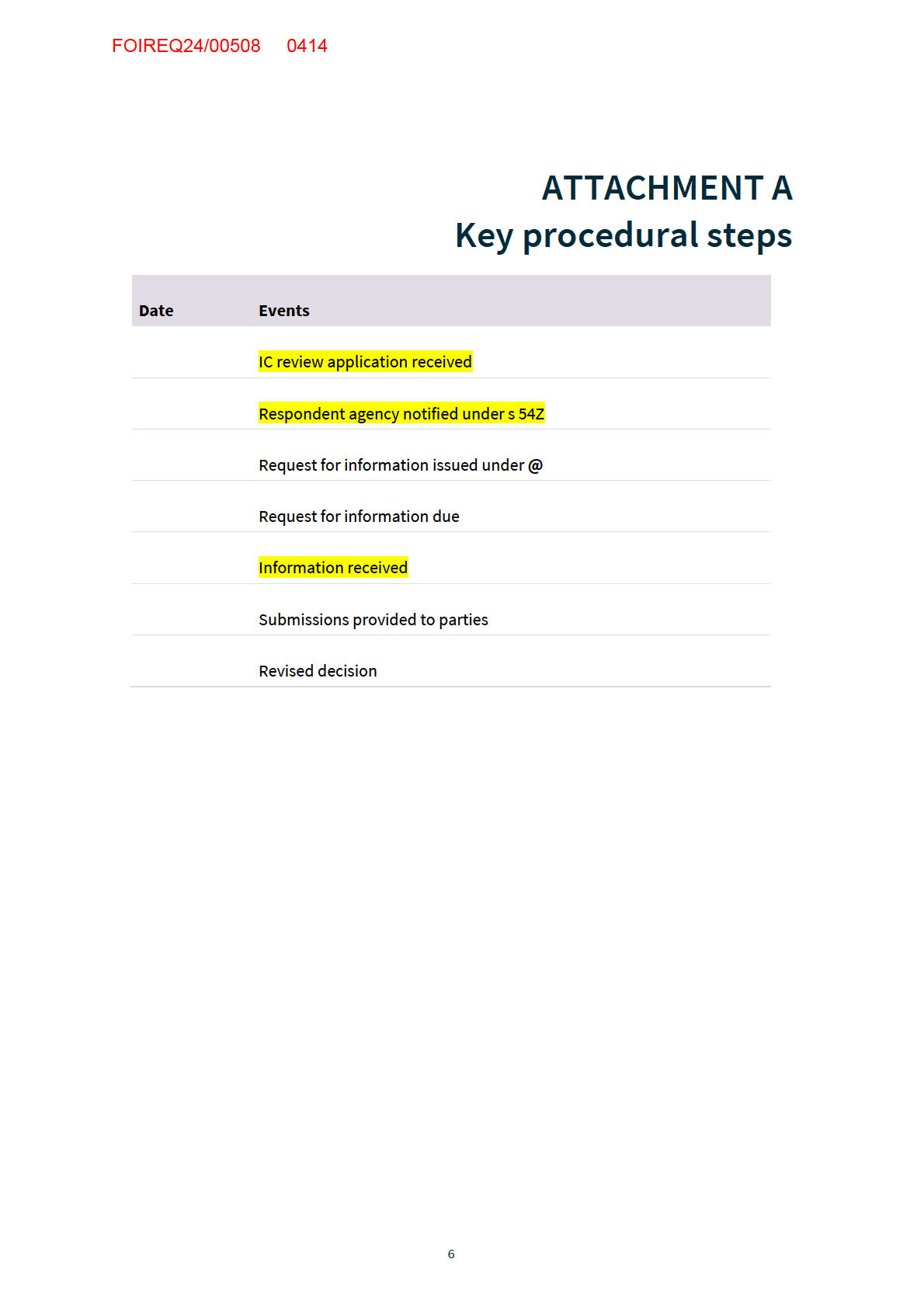
FOIREQ24/00508 0415
Subject: OAIC – s 55R - Forward Notice - MR – Infromation Commissioner review application about
the [Respondent Name]
Our reference:
Agency/Minister reference:
Applicant Name Agency/Minister By email: [Agency]
Copied to: [Agency EL2]
Copied to: [Agency SES band 1]
Notice of Information Commissioner review and request for documents
Good morning/afternoon FOI Contact Officer,
We have not received a compliant response to below issued Notice and Direction by the due date.
Consequently, we will proceed with the requirement for the production of documents under
section 55R of the FOI Act. The s 55R Notice will be issued to the relevant SES band 2 (or
equivalent) within your Agency.
[If relevant] We further note, the engagement requirement provided at paragraphs 3.8 to 3.13 of
the Direction as to certain procedures to be followed by agencies and ministers in Information
Commissioner reviews has not yet commenced. You are required to commenced engagement with
the applicant as soon as possible to resolve or narrow the issues in dispute.
Please note that failure to comply with the notice or direction is an offence punishable by six
months’ imprisonment (per section 55R(5)).
For further details, refer to paragraphs 2.10 and 3.18 of the Direction as to certain procedures to be
followed by agencies and ministers in Information Commissioner reviews.
Please note:
Agencies are advised to apply for an extension before the due date has passed if compliance with
the notice or direction cannot be met. However, such extensions will only be granted in exceptional
circumstances. [if relevant] As the Agency did not seek an extension to comply with the Notice or
Direction before the due date had passed, there are very limited circumstances upon which we
would consider an extension request to be appropriate in response to this email.
Kind regards,
FOIREQ24/00508 0416
OAIC reference: [MRXX/XXXXX]
Agency reference: [X]
[Requestor]
By email: [email address]
IC review application about a decision of [agency (agency acronym)]
Dear [Requestor]
Thank you for your correspondence seeking an update regarding the progress of the above IC review
application with the Office of the Australian Information Commissioner (the OAIC) about a decision of
[agency (agency acronym/abbreviation)] under the
Freedom of Information Act 1982 (Cth).
[First case update request] At this stage, the matter is awaiting allocation to a review adviser. Due to
the number of IC review applications on hand, and the need to prioritise IC review applications that
were received earlier, this may not occur for some time. After the file is allocated, the review adviser
will contact you to advise of next steps in the matter.
[Or subsequent case update requests] Unfortunately, it remains the case that the matter is awaiting
allocation to a review adviser. Due to the number of IC review applications on hand, and the need to
prioritise IC review applications that were received earlier, this may not occur for some time. After the
file is allocated, the review adviser will contact you to advise of next steps in the matter.
To assist you in determining an approximate timeframe, the OAIC is currently focusing on the case
management and finalisation of aged matters, particularly the IC review applications received in 2020
and 2021. The OAIC received your IC review application on X date.
In the meantime, we are working to progress the matter in readiness for allocation.
Should you wish to follow up on this matter further, please contact the OAIC enquiries line
on 1300
363 992 or email xxxxx@xxxx.xxx.xx and quote the reference number [MRXX/XXXXX].
Regards
FOIREQ24/00508 0417
• *Tab 0. Cover sheet/Review case plan
•
*Tab 1. Draft decision
• *Tab 2. FOI request (dated XX/XX/XXXX)
• *Tab 3. FOI decision(s)
o *Tab 3(a). Primary decision (dated XX/XX/XXXX)
o *Tab 3(b). Internal review decision (dated XX/XX/XXXX)
• *Tab 4. IC review application
• *Tab 5. Revised decision 55G (dated XX/XX/XXXX)
• *Tab 6
o *Tab 6(a). A's submissions
o *Tab 6(b). A's submissions
o *Tab 6(c). A's submissions
• *Tab 7
o *Tab 7(a). R's submissions
o *Tab 7(b). R's submissions (evidence only)
o *Tab 7(c). R's submissions
• *Tab 8
o *Tab 8(a). Third party notice under 54P
o *Tab 8(b). Third party consultation correspondence
o *Tab 8(c). Third party submissions
• *Tab 9
o *Tab 9(a). Document at issue
o *Tab 9(b). Schedule of documents
• *Tab 10. IGIS
FOIREQ24/00508 0418
Our ref: [Insert reference]
Your ref: [Insert]
Dear [Name of Departmental officer]
I refer to the above IC review.
In the decision under review, the Department suggested that it excluded personal information and
contact details of staff (‘staff details’) from the scope of the request under s 22 as a matter of
course in accordance with its policy.
The [Department/Agency] has not provided evidence supporting the applicant’s agreement to
exclude the material from the scope of their request. As noted in recent decisions (see, for
example,
Paul Farrell and Department of Home Affairs (No. 2) (Freedom of information) [2024]
AICmr 78 (15 April 2024)), the [Department’s/Agency] practice in this regard is inconsistent with
previous IC review decisions and regulatory guidance.
It is likely that a decision maker will find that staff details are not irrelevant. Given the passage of
time since the [Department/Agency] provided its most recent submission (which predates the
recent decisions referred to above), we are giving the [Department/Agency] an opportunity to
advise if it wishes to raise an alternative exemption in relation to that material, and to make
submissions.
Next steps
If the [Department/Agency] wishes to raise an alternative exemption in relation to staff details,
please provide a submission to the OAIC and the applicant [insert applicant’s email address] by [10
business days].
Regards
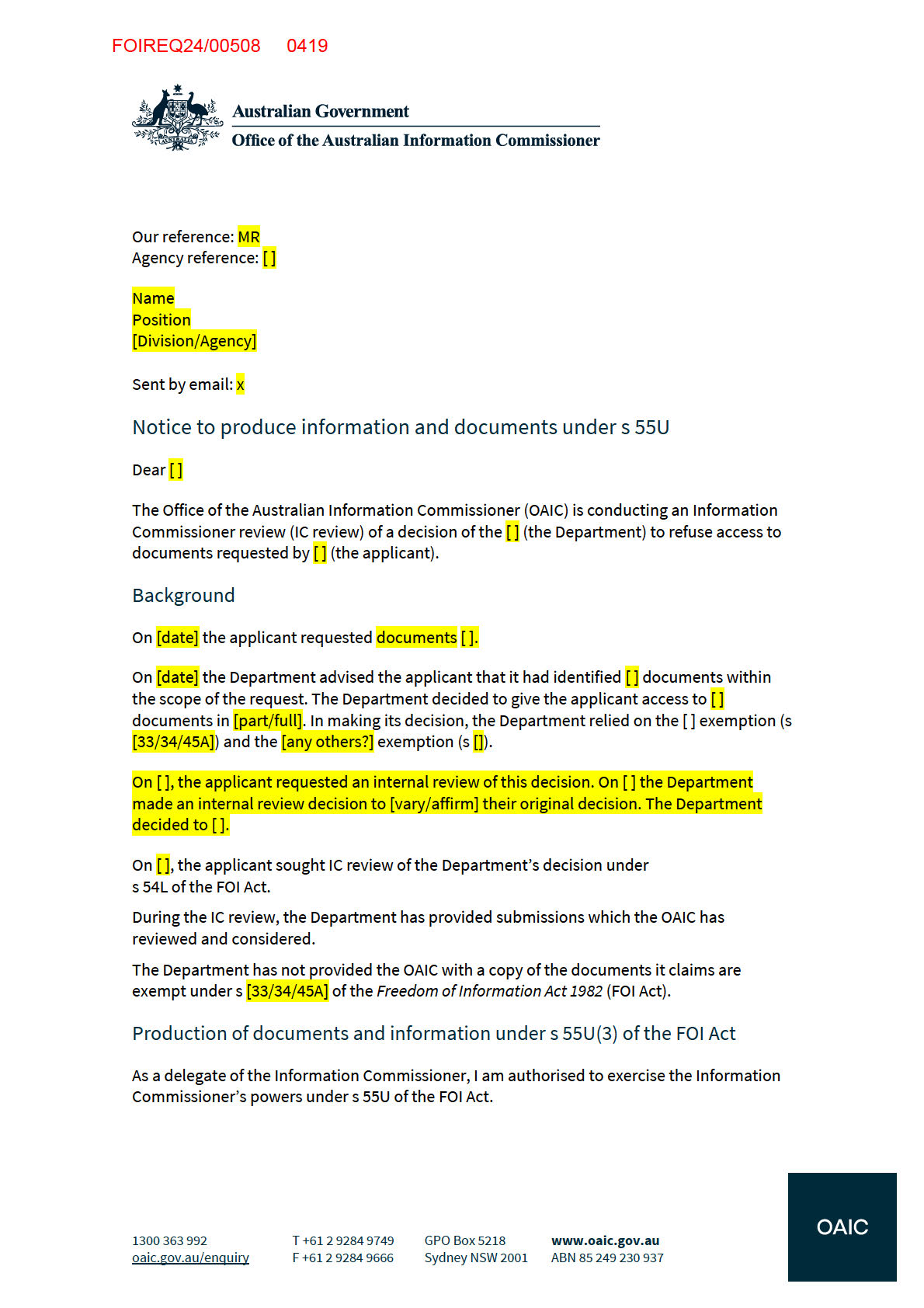
FOIREQ24/00508 0420
Section 55U(3) of the FOI Act provides that if the Information Commissioner is not satisfied
by evidence on affidavit or otherwise that documents are exempt documents under s 33, the
Commissioner may require that the document be produced for inspection.
I am not satisfied, based on the submissions and reasons provided by the Department to
date, that the Department has provided sufficient evidence to establish that the relevant
documents are exempt under s 33 of the FOI Act.
Therefore, under s 55U of the FOI Act, I require you to produce a marked up and unredacted
copy of the documents that the Department found to be exempt under s 33 of the FOI Act.
Compliance with this notice
Compliance with this notice can be met by delivery of the required documents electronically
or via safe-hand delivery. Please email us to arrange safe-hand delivery.
I require you to produce the documents requested no later than
close of business [ ].
Yours sincerely
Sandra Wavamunno
Director
Freedom of Information
Office of the Australia Information Commission
4 November 2024
2
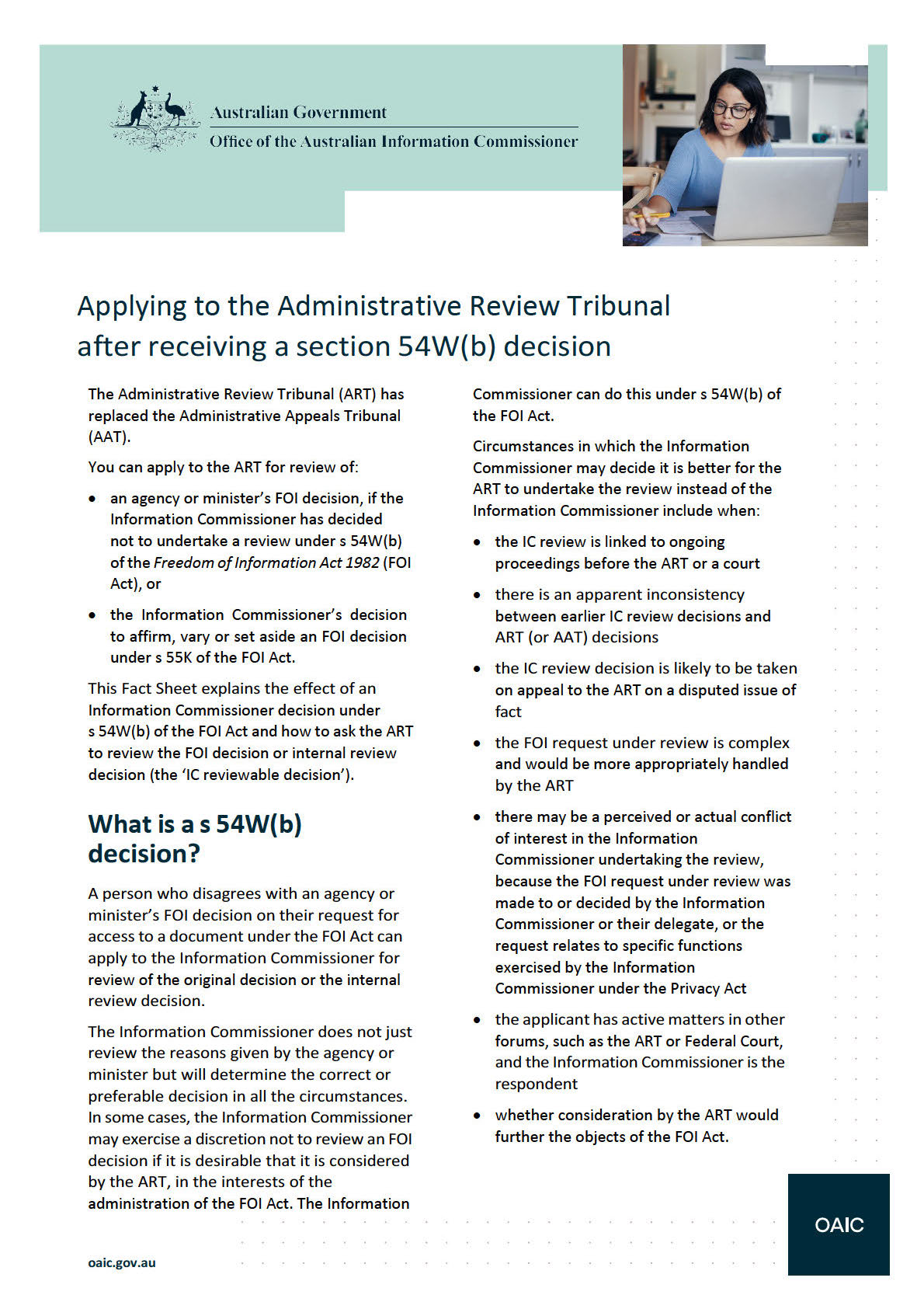
FOIREQ24/00508 0421
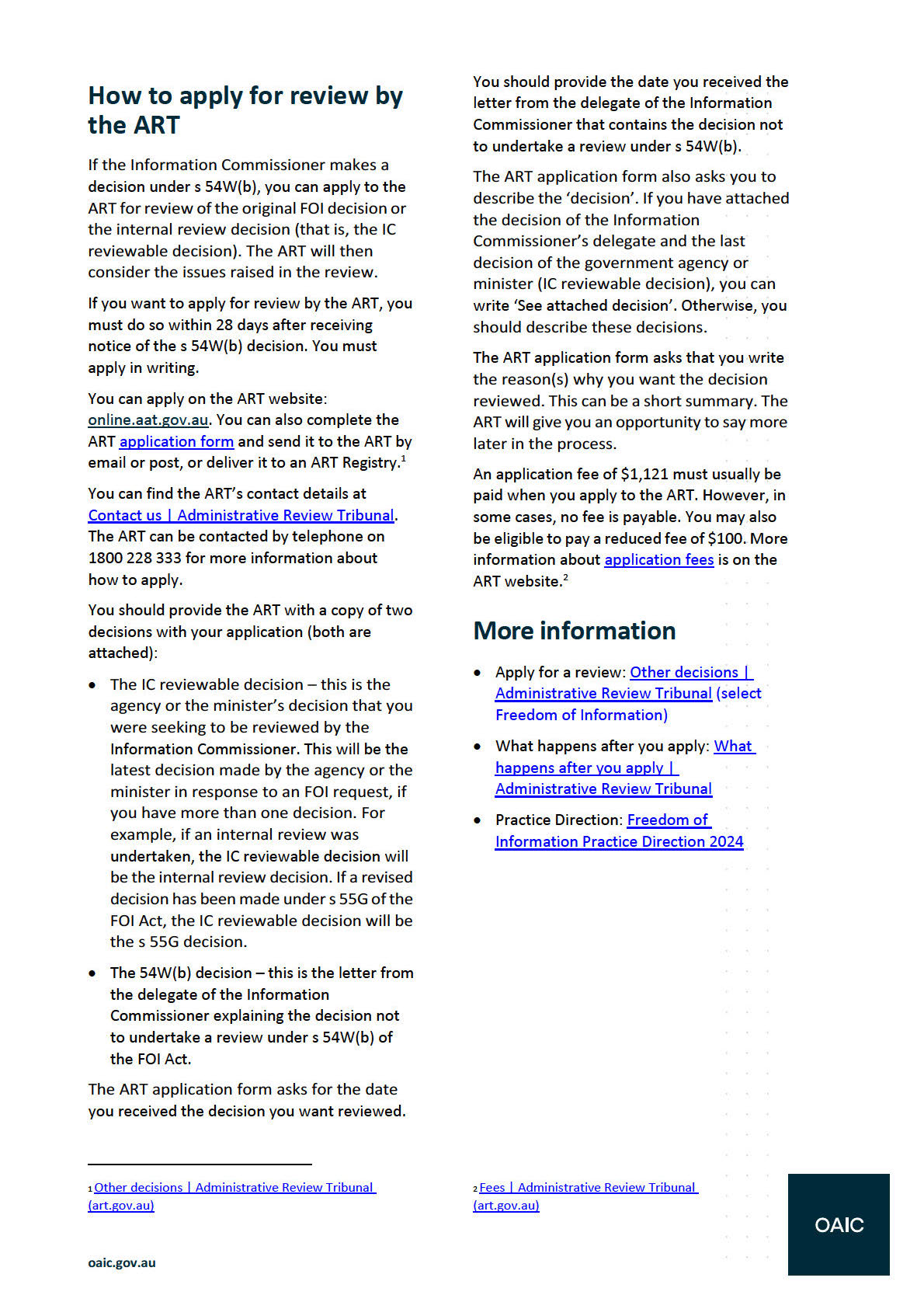
FOIREQ24/00508 0422
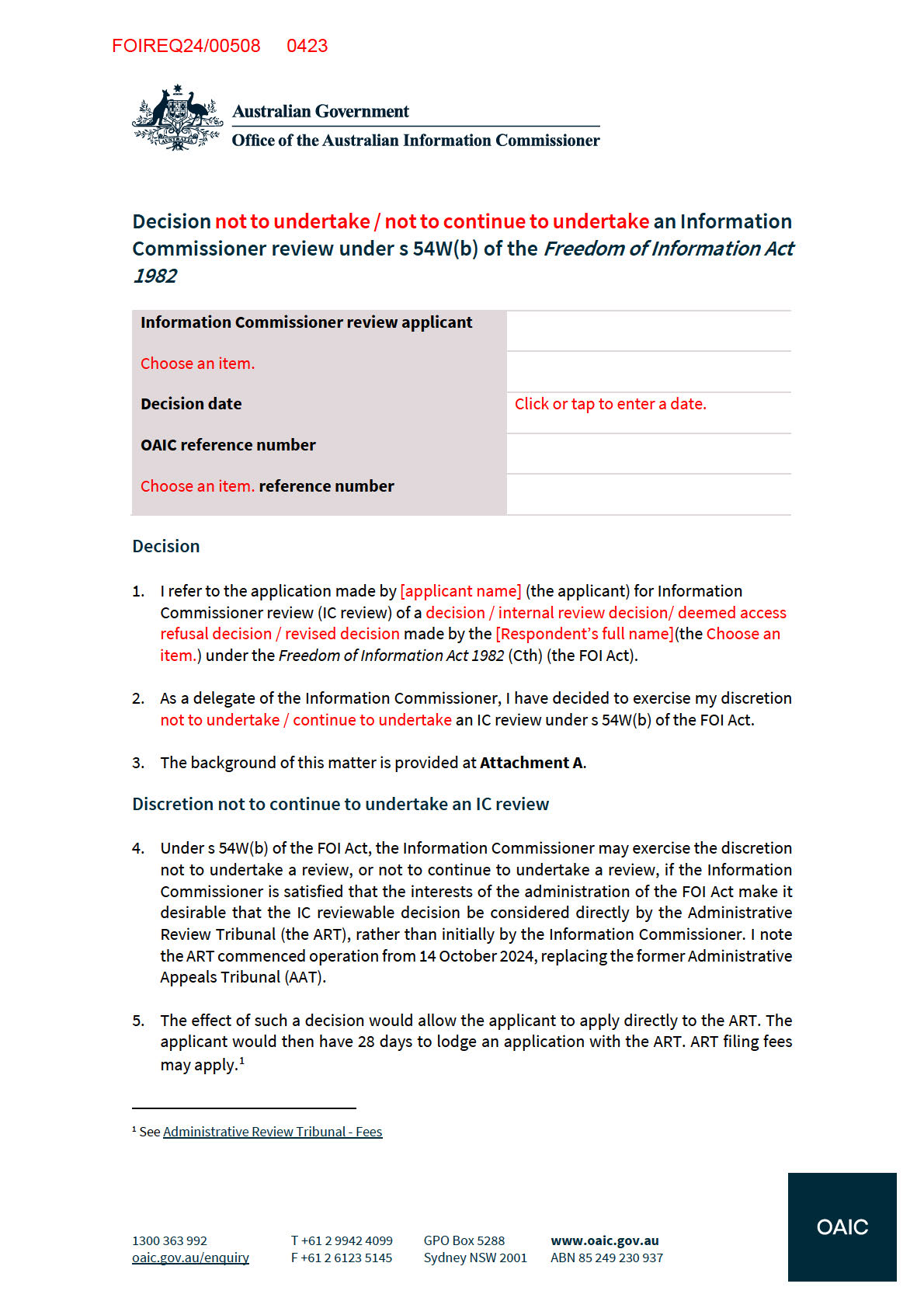
FOIREQ24/00508 0424
6. This is also referred to in the Guidelines issued by the Australian Information
Commissioner under s 93A (FOI Guidelines) at [10.104] and [10.105], which states:
The Information Commissioner may decline to undertake a review if satisfied ‘that the
interests of the administration of the [FOI] Act make it desirable’ that the AAT consider the IC
reviewable decision (s 54W(b)). It is intended that the Information Commissioner will resolve
most IC review applications. Circumstances in which the Information Commissioner may
decide that it is desirable for the AAT to consider the IC reviewable decision instead of the
Information Commissioner continuing with the IC review include:2
• where the IC review is linked to ongoing proceedings before the AAT or a court
• where there is an apparent inconsistency between earlier IC review decisions and AAT
decisions
• where, should the application progress to an IC review decision, the IC review decision is
likely to be taken on appeal to the AAT on a disputed issue of fact
• where the FOI decision under review is of a level of complexity that it will be more
appropriately handled through the procedures of the AAT
• where there may be a perceived or actual conflict of interest in the Information
Commissioner undertaking the IC review, including where:
- the FOI request under review was made to, or decided by, the Information
Commissioner or their delegate
- the FOI request or material at issue relate to specific functions exercised by the
Information Commissioner under the Privacy Act
- the applicant has active matters in other forums, including the AAT or Federal
Court and the Information Commissioner is the respondent
• where consideration by the AAT would further the objects of the FOI Act, particularly in
relation to the performance and exercise of functions and powers given by the FOI Act to
facilitate and promote public access to information, promptly and at the lowest
reasonable cost (s 3(4)).
7. However, the circumstances in which the Information Commissioner may consider it
desirable that the ART consider the IC review application, as outlined in the FOI Guidelines
above, are not exhaustive. There will be circumstances that are not listed where the
Information Commissioner may deem it desirable to refer the matter to the ART.
8. Further, the Office of the Information Commissioner (OAIC) may take into account the
views of the parties to an IC review before concluding an IC review pursuant to s 54W(b).
While the Information Commissioner will consider the views of the review parties before
finalising an IC review under s 54W(b), the decision whether it is more appropriate for the
ART to consider the IC reviewable decision ultimately rests with the Information
Commissioner. Through the functions conferred on the Information Commissioner under
the FOI Act, the Information Commissioner will be in the most informed position to
2 See McKinnon and Department of Immigration and Citizenship [2012] AICmr 34
2
FOIREQ24/00508 0425
determine whether the interests of the administration of the FOI Act make it desirable for
the ART to consider the IC reviewable decision.
Reasons for decision
9. I am satisfied that it is in the interests of the administration of the FOI Act that the IC
reviewable decision be considered by the ART in the first instance because:
• [Insert reasoning]
10. In deciding whether to exercise the discretion not to undertake a review, I have
considered:
• the Agency’s decision / internal review decision/ deemed access refusal decision OR
submissions dated DD Month Year.
• the documents at issue / nature of the request
• the FOI Act, in particular 54W [example: s 11A(5), s 22, s33.]
• the Guidelines issued by the Australian Information Commissioner under s 93A of the
FOI Act3 to which agencies must have regard in performing a function or exercising a
power under the FOI Act, in particular [10.104] and [10.105]
• the views of the parties
• The Explanatory Memorandum to the Freedom of Information Amendment (Reform)
Bill 2009
11. With consideration to the above, I am satisfied, as a delegate of the Information
Commissioner, that it would be more appropriate and efficient for the application to be
made directly to the ART. As such, I have decided to exercise my discretion to decide not
to undertake / continue to undertake an IC review under s 54W(b) of the FOI Act.
12. The applicant has 28 calendar days from the date of this notice to make an application for
review of the IC reviewable decision to the ART, in accordance with s 57A of the FOI Act.
13. I confirm that this IC review is now closed. Your review rights are set out below.
Yours sincerely,
3 See Office of the Australian Information Commissioner
, Guidelines issued by the Australian Information
Commissioner under s 93A of the
Freedom of Information Act 1982 (FOI Guidelines).
3
FOIREQ24/00508 0426
Hannah Holswilder
Director
Freedom of Information Branch
Office of the Australian Information Commissioner
DD Month 2024
4
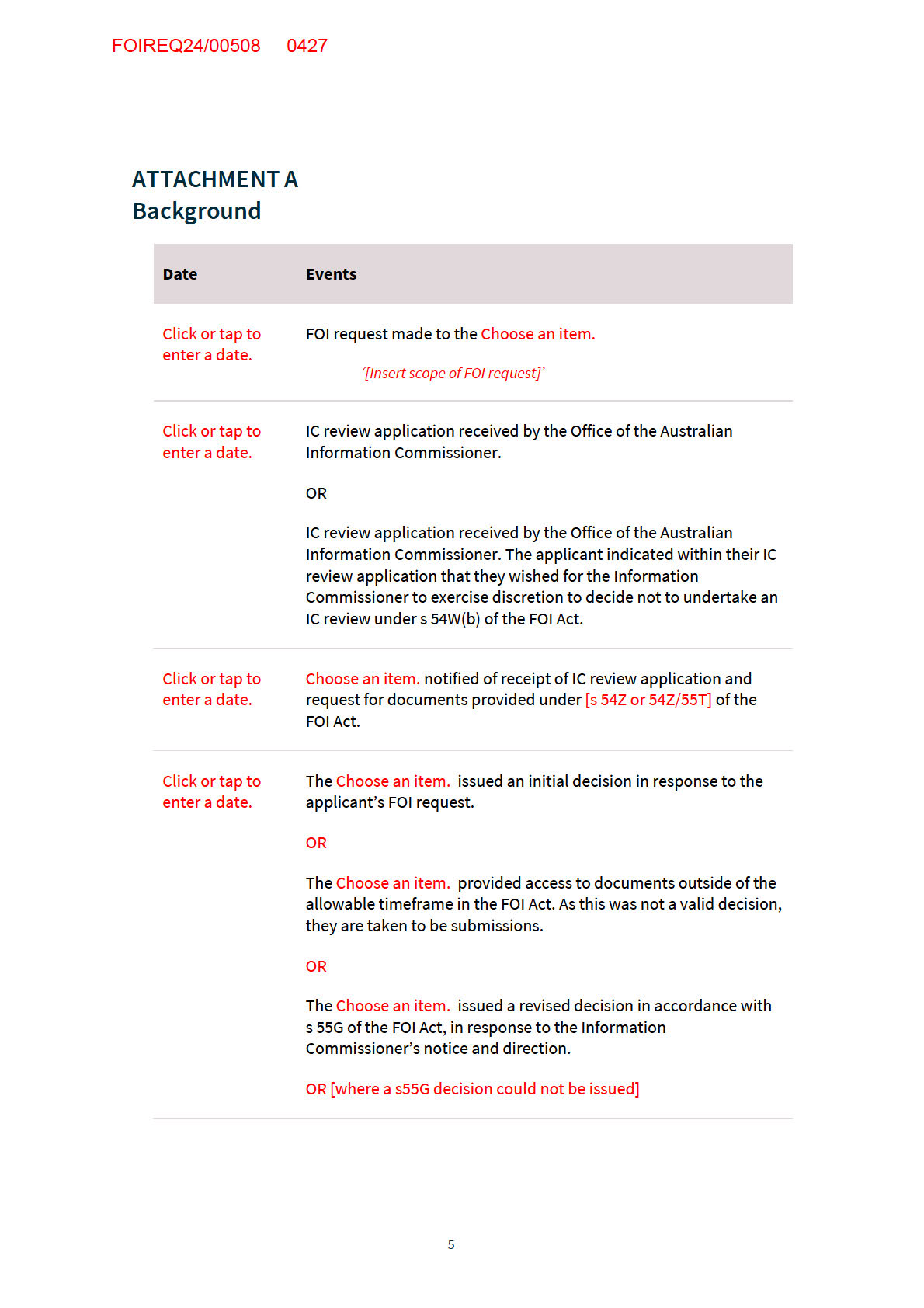
FOIREQ24/00508 0428
Choose an item. submission received to establish why the
Information Commissioner should make a decision adverse to the
applicant under s 55D(1) of the FOI Act.
Click or tap to
An officer of the Information Commissioner requested the
enter a date.
applicant/ Agency/Minister /parties provide submissions as to why
the Information Commissioner should not exercise discretion to
finalise IC review application s 54W(b) of the FOI Act
Submissions were requested from the applicant/ Agency/Minister
/parties for consideration by the Information Commissioner, or a
delegated member of staff, by Click or tap to enter a date.
Click or tap to
Applicant s 54W(b) submissions received, advising:
enter a date.
‘[insert applicant submissions (these may be included in the IC
review application]’
Click or tap to
Choose an item. s 54W(b) submissions received, advising:
enter a date.
‘[insert Agency/Minister submissions (these wil be in response to
the IC’s 54W(b) ITD]’
Click or tap to
An officer of the Information Commissioner provided the applicant
enter a date.
with the Agency’s/Minister’s submission.
Fulsome submissions were requested from the applicant for
consideration by the Information Commissioner, or a delegated
member of staff, by Click or tap to enter a date.
Click or tap to
Further s 54W(b) submissions received from the applicant,
enter a date.
advising:
‘[insert applicant’s further submissions (these wil be in response to
the IC’s 54W(b) ITD]’
6
FOIREQ24/00508 0429
Review rights
Judicial review
You can apply to the Federal Court of Australia or the Federal Circuit Court for a review of a
decision of the Information Commissioner if you think that a decision by the Information
Commissioner not to review or not to continue to undertake review of this IC review
application under the
Freedom of Information Act 1982 (the FOI Act) is not legally correct. You
can make this application under the
Administrative Decisions (Judicial Review) Act 1977.
The Court wil not review the merits of your case, but it may refer the matter back to the
Information Commissioner for further consideration if it finds the decision was wrong in law
or the Information Commissioner's powers were not exercised properly.
An application for review must be made to the Court within 28 days of the OAIC sending the
decision or determination to you. You may wish to seek legal advice as the process can
involve fees and costs. Please contact the Federal Court registry in your state or territory for
more information or visit the Federal Court website.4
Making a complaint to the Commonwealth Ombudsman
If you believe you have been treated unfairly by the OAIC, you can make a complaint to the
Commonwealth Ombudsman (the Ombudsman). The Ombudsman's services are free. The
Ombudsman can investigate complaints about the administrative actions of Australian
Government agencies to see if you have been treated unfairly.
If the Ombudsman finds your complaint is justified, the Ombudsman can recommend that
the OAIC reconsider or change its action or decision or take any other action that the
Ombudsman considers is appropriate. You can contact the Ombudsman's office for more
information on 1300 362 072 or visit the Commonwealth Ombudsman’s website at
http://www.ombudsman.gov.au.
Accessing your information
If you would like access to the information that we hold about you, please
contact xxxxx@xxxx.xxx.xx. More information is available on the
Access our
information page on our website.
4 See Federal Court of Australia
7
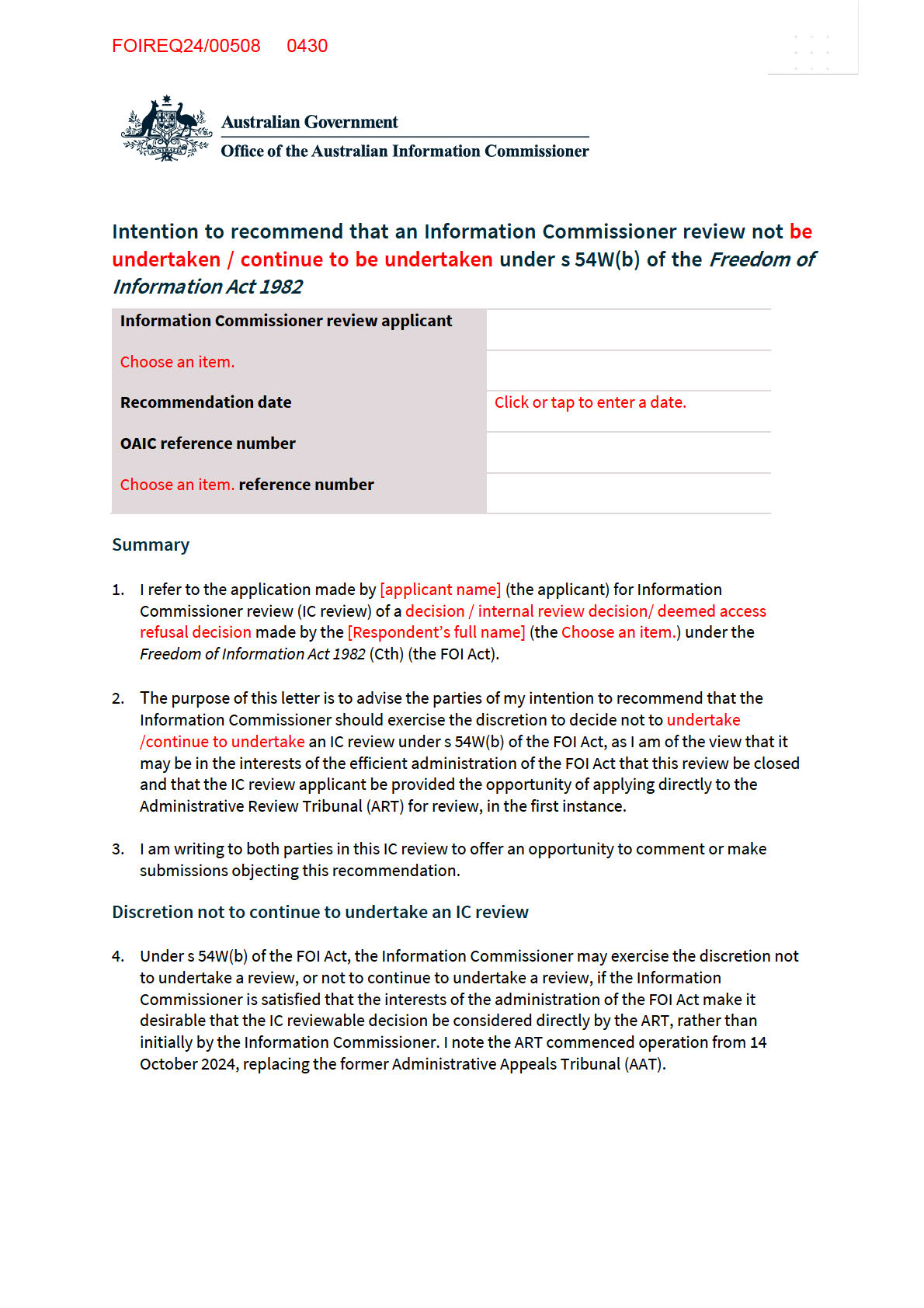

FOIREQ24/00508 0431
5. The effect of such a decision would allow the applicant to apply directly to the ART. The
applicant would then have 28 days to lodge an application with the ART. ART filing fees may
apply.1
6. This is also referred to in the Guidelines issued by the Australian Information Commissioner
under s 93A (FOI Guidelines) at [10.104] and [10.105], which states:
The Information Commissioner may decline to undertake a review if satisfied ‘that the interests of
the administration of the [FOI] Act make it desirable’ that the AAT consider the IC reviewable
decision (s 54W(b)). It is intended that the Information Commissioner will resolve most IC review
applications. Circumstances in which the Information Commissioner may decide that it is desirable
for the AAT to consider the IC reviewable decision instead of the Information Commissioner
continuing with the IC review include:2
• where the IC review is linked to ongoing proceedings before the AAT or a court
• where there is an apparent inconsistency between earlier IC review decisions and AAT
decisions
• where, should the application progress to an IC review decision, the IC review decision is likely
to be taken on appeal to the AAT on a disputed issue of fact
• where the FOI decision under review is of a level of complexity that it will be more
appropriately handled through the procedures of the AAT
• where there may be a perceived or actual conflict of interest in the Information Commissioner
undertaking the IC review, including where:
- the FOI request under review was made to, or decided by, the Information
Commissioner or their delegate
- the FOI request or material at issue relate to specific functions exercised by the
Information Commissioner under the Privacy Act
- the applicant has active matters in other forums, including the AAT or Federal Court
and the Information Commissioner is the respondent
• where consideration by the AAT would further the objects of the FOI Act, particularly in relation
to the performance and exercise of functions and powers given by the FOI Act to facilitate and
promote public access to information, promptly and at the lowest reasonable cost (s 3(4)).
7. However, the circumstances in which the Information Commissioner may consider it
desirable that the ART consider the IC review application, as outlined in the FOI Guidelines
above, are not exhaustive. There will be circumstances that are not listed where the
Information Commissioner may deem it desirable to refer the matter to the ART.
Reasons for recommendation
8. In this IC review, it appears that it may be in the interests of the efficient administration of the
FOI Act that that a delegate of the Information Commissioner exercises the discretion to
1 See Administrative Review Tribunal - Fees
2 See McKinnon and Department of Immigration and Citizenship [2012] AICmr 34

FOIREQ24/00508 0432
decide not to undertake / continue to undertake an IC review under s 54W(b) of the FOI Act
because:
• [Insert reasons]
Next steps
9. The Office of the Information Commissioner (OAIC) may take into account the views of the
parties to an IC review before concluding an IC review pursuant to s 54W(b). While the
Information Commissioner will consider the views of the review parties before finalising an IC
review under s 54W(b), the decision whether it is more appropriate for the ART to consider the
IC reviewable decision ultimately rests with the Information Commissioner. Through the
functions conferred on the Information Commissioner under the FOI Act, the Information
Commissioner will be in the most informed position to determine whether the interests of the
administration of the FOI Act make it desirable for the ART to consider the IC reviewable
decision.
10. If you disagree with this proposed recommendation, please write to us by Click or tap to enter
a date.
[1-2 weeks] and advise us of your reasons. If you agree with the proposed
recommendation, you are not required to respond. However, should either party wish to
provide additional information for consideration by the Information Commissioner, or a
delegated member of staff, you may do so by the abovementioned date.
9. If more time is needed, a request for an extension of time must be made to the OAIC at the
earliest opportunity within the period provided for response, and no later than 2 days before
that period is due to expire. Requests for more time must explain the exceptional
circumstances that necessitate additional time and propose a new date for response.
Approval of an extension request is at the discretion of the OAIC.
11. The parties will be notified and provided review rights if the IC review is finalised under s 54W(b)
of the FOI Act.
Yours sincerely,
[OAIC Officer]
Review Advisor
Freedom of Information Branch
Office of the Australian Information Commissioner
DD Month 2024
FOIREQ24/00508 0433
Draft s54X Correspondence to:
Subject line: OAIC – MR– s 54X – Notification of a decision not to undertake/ continue to undertake
an Information Commissioner review
Our reference:
Agency/Minister reference:
Affected Party
Agency
By email: [Affected Party Email Address]
Notification of a decision not to undertake/ continue to undertake an
Information Commissioner review
Dear [Affected Party],
In accordance with s 54X of the
Freedom of Information Act 1982 (the FOI Act), you are being
notified that the Information Commissioner has today concluded the Information Commissioner
review under s 54W(b) of the FOI Act.
An excerpt of the reasons for decision is provided below:
[insert screenshot of the ‘reasons for decision’ paragraph/s from pdf 54W(b) decision]
The applicant 28 calendar days from today to lodge an application for review with the
Administrative Review Tribunal
(the ART), in accordance with s 18 of
the Administrative Review
Tribunal Act 2024 (the ART Act).
Under s 60AA of the FOI Act, the Agency/Minister has an obligation to notify any person whose
interests are affected by the decision that an application has been made to the ART.
Section 22(1)(c)) of the ART Act provides that, if an application has been made by a person for a
review of a decision, any other person whose interests are affected by the decision may apply to
be made a party to the proceeding.
Please direct all future correspondence relating to the decision to the Agency/Minister.
I confirm our file is now closed.
Kind regards,
